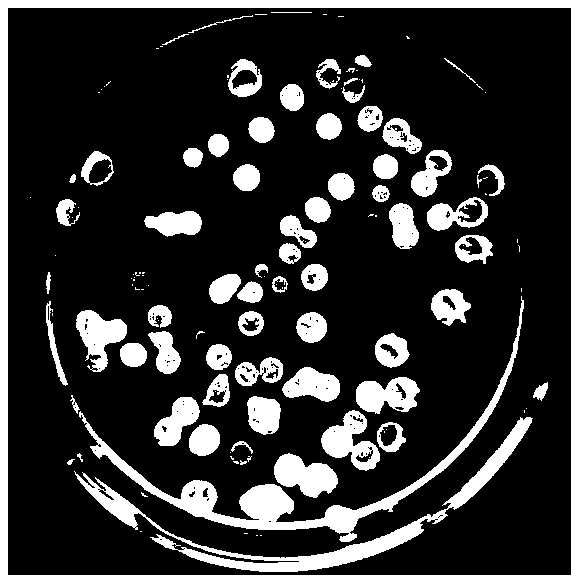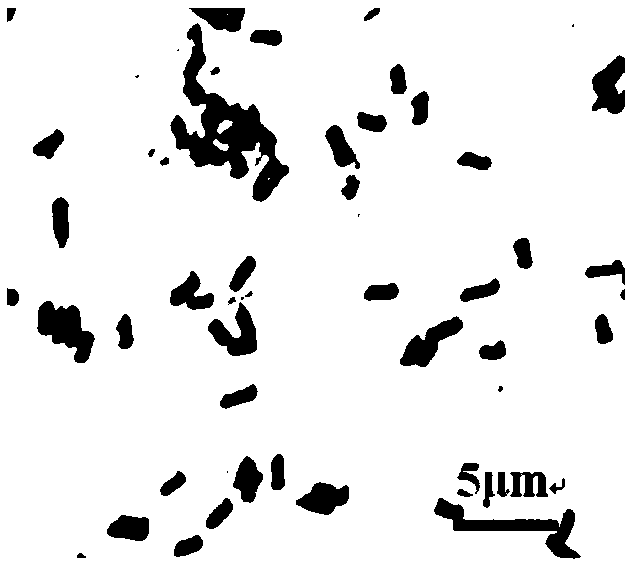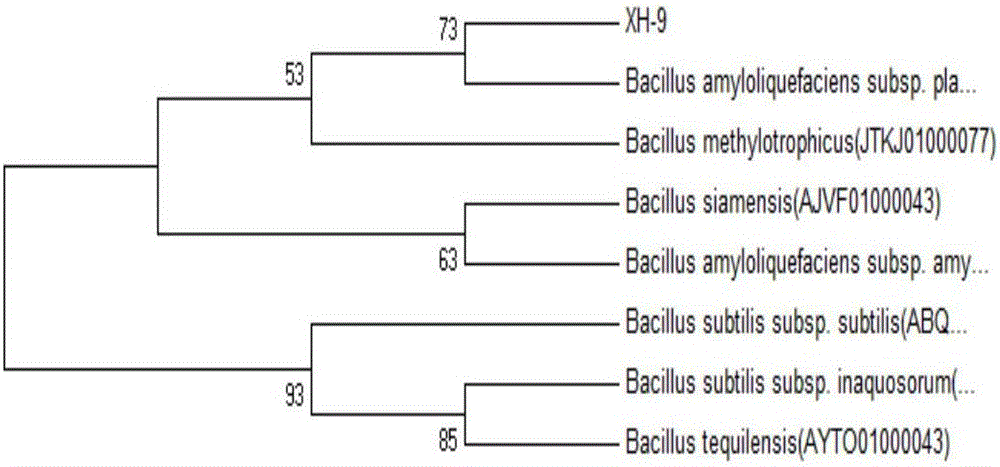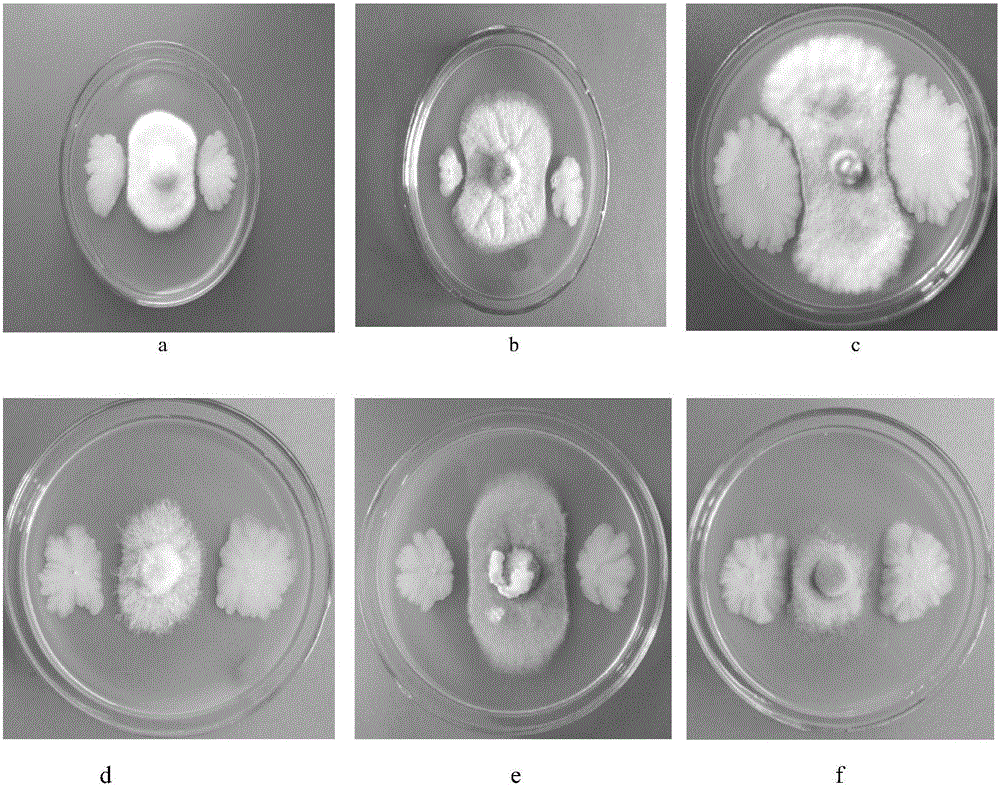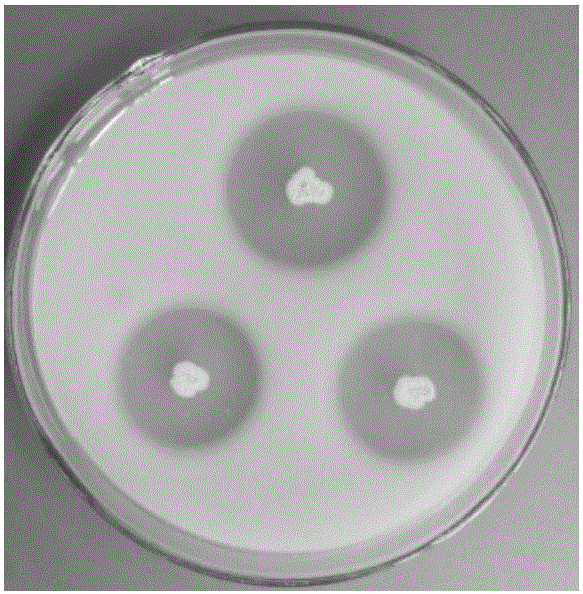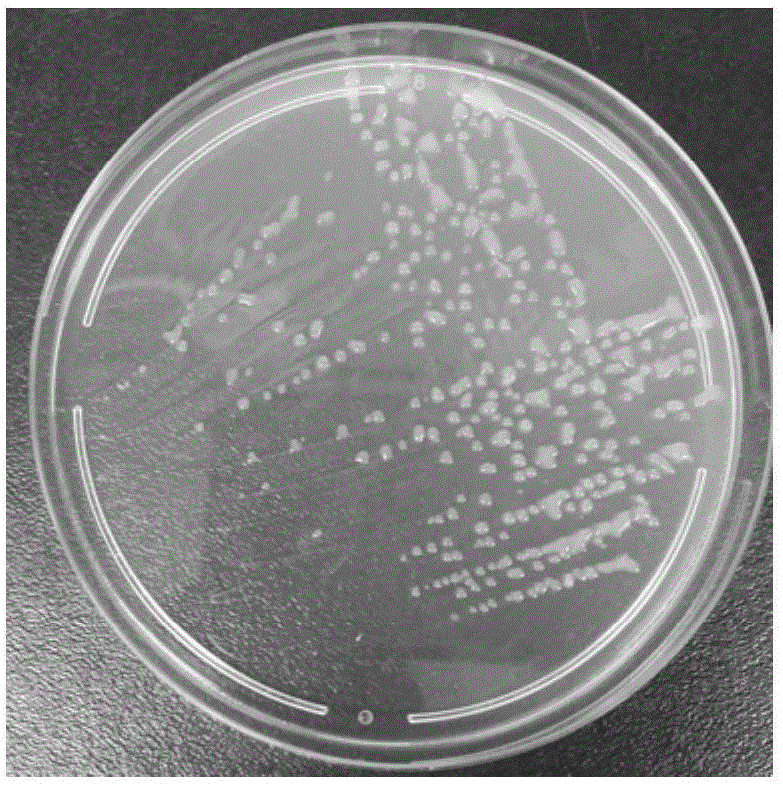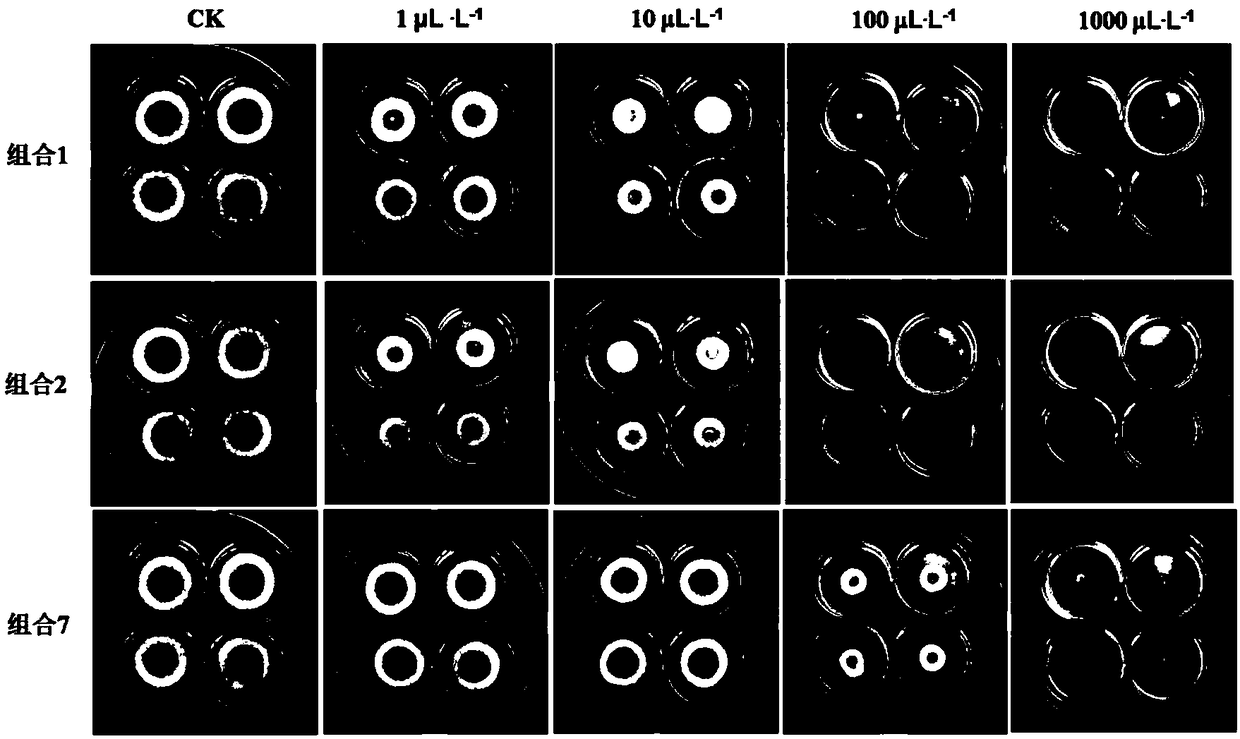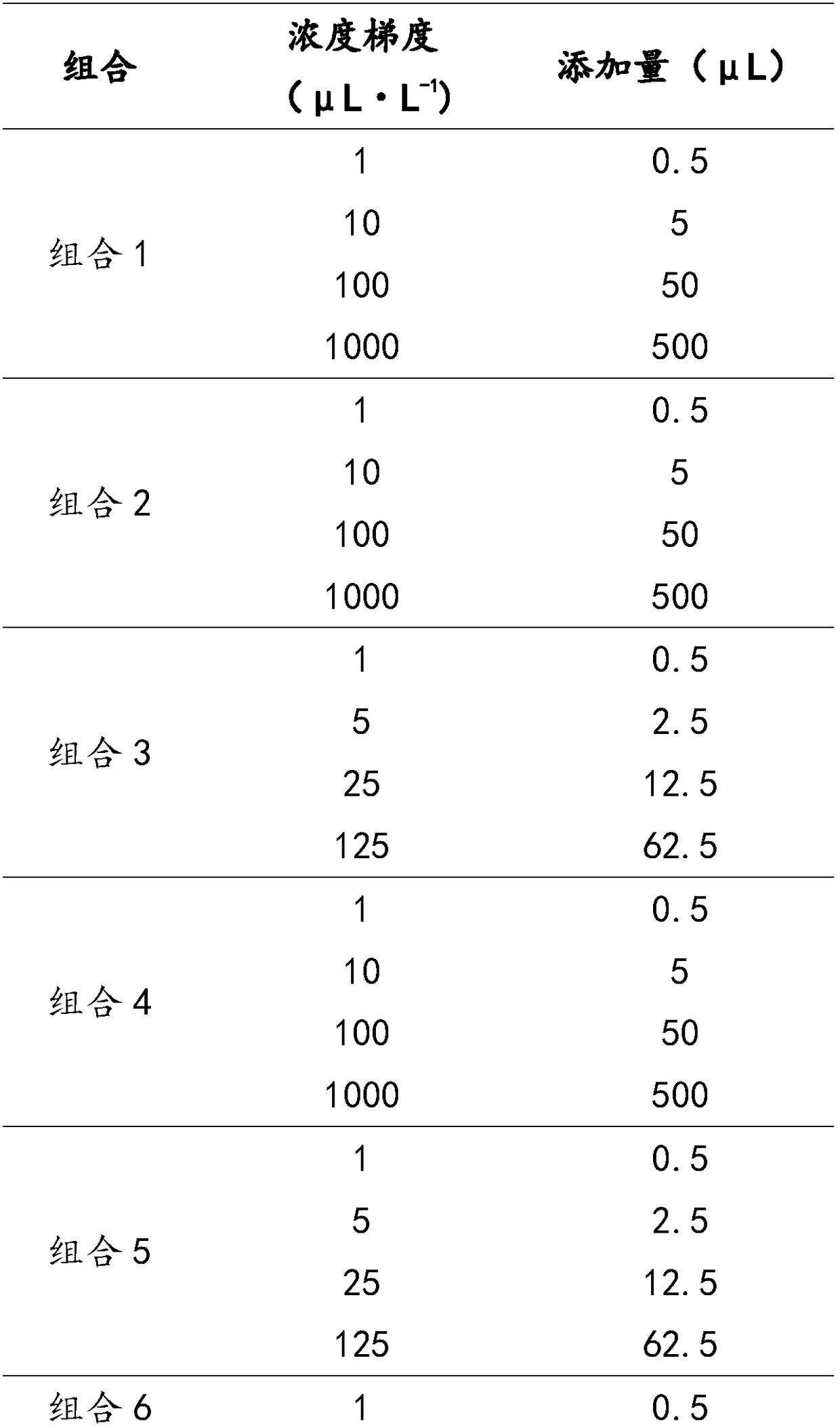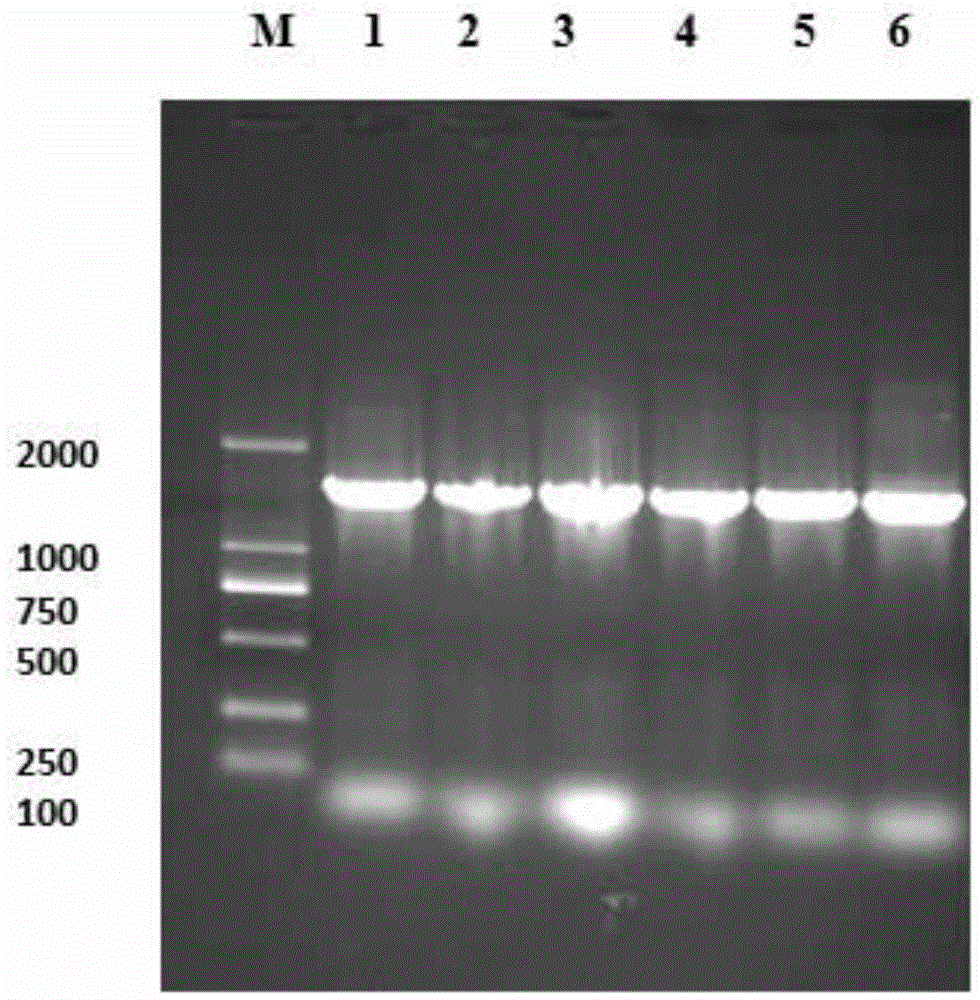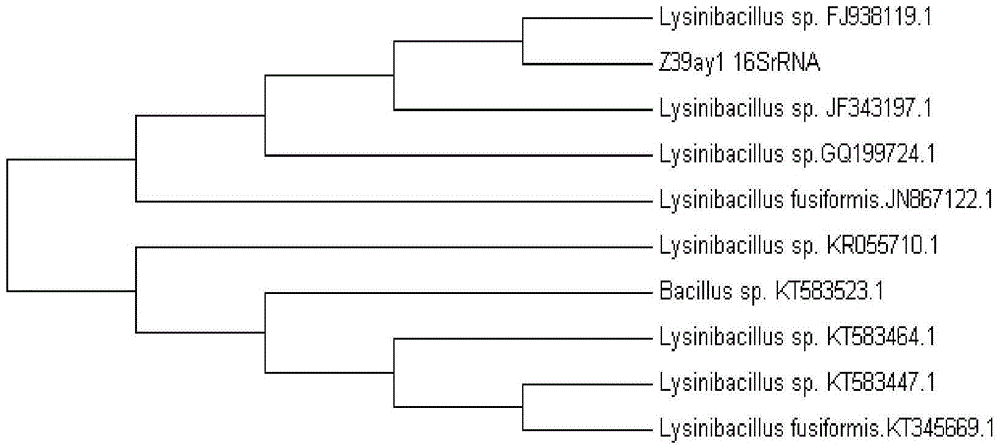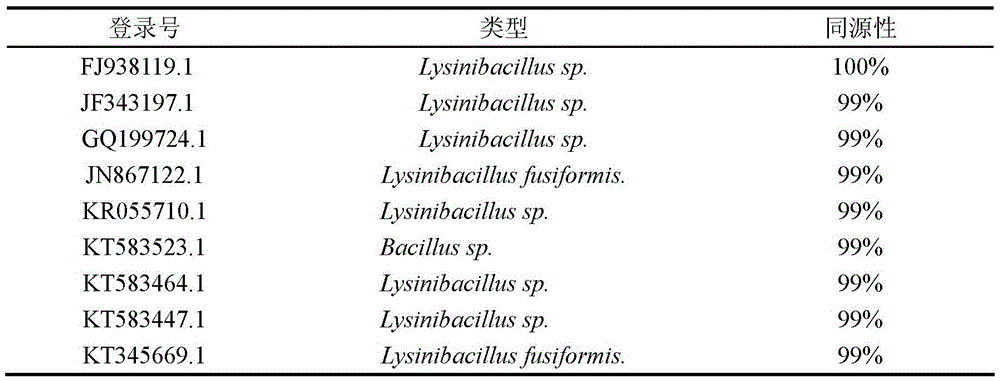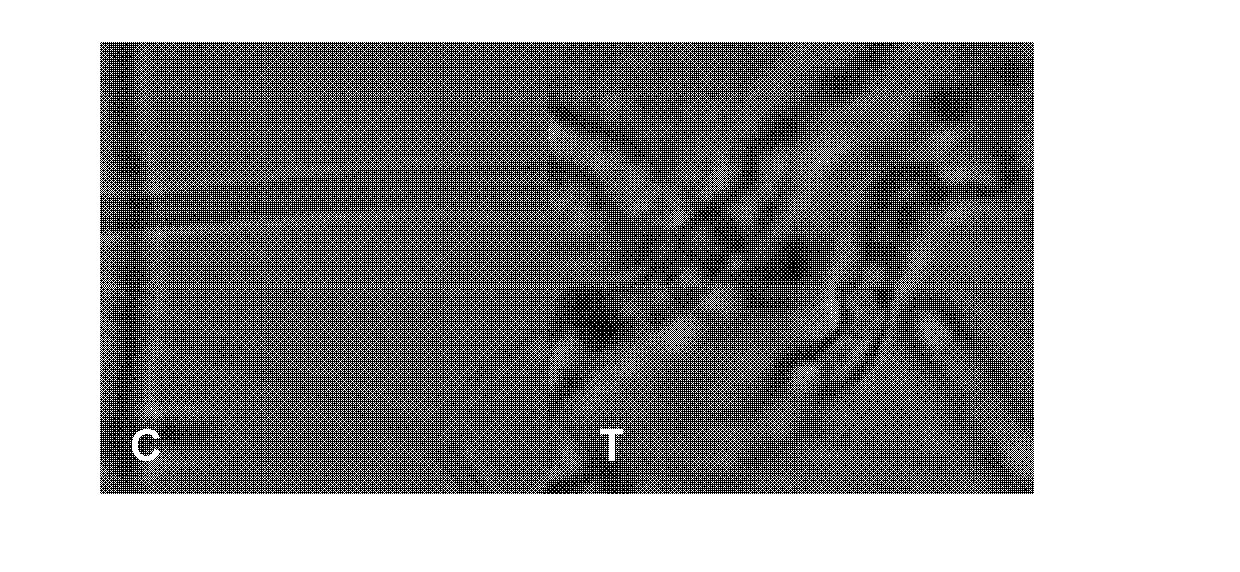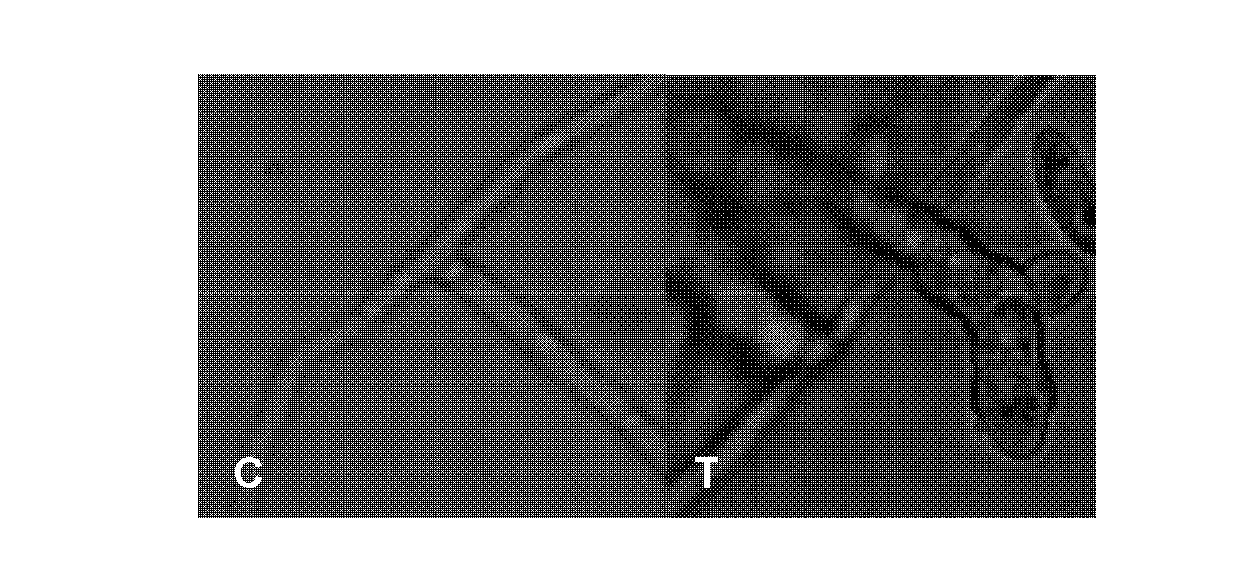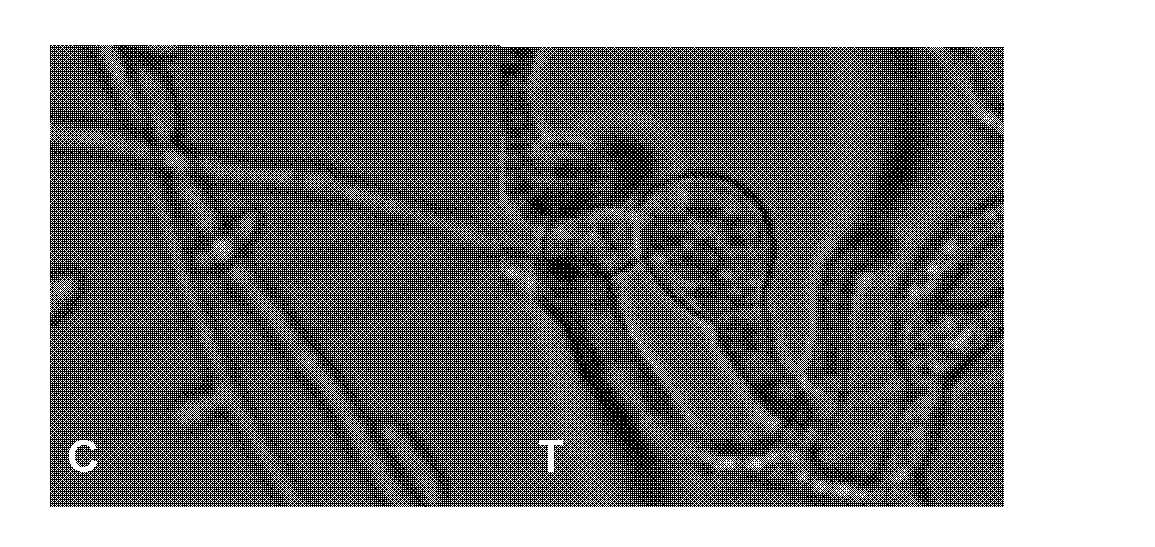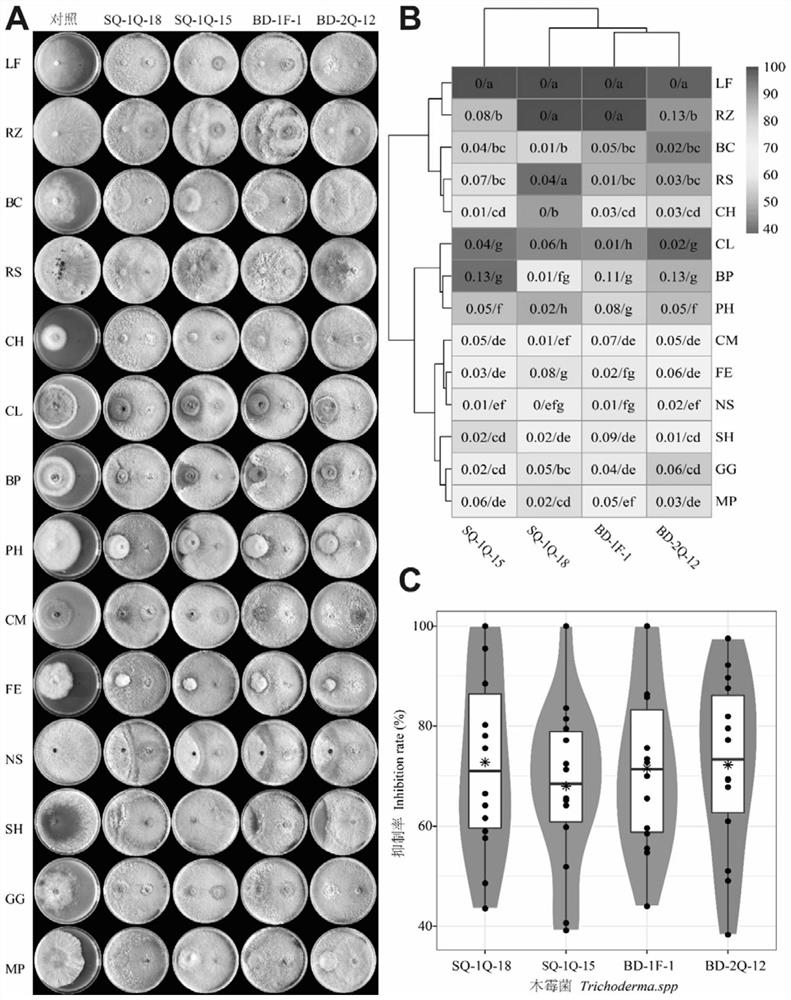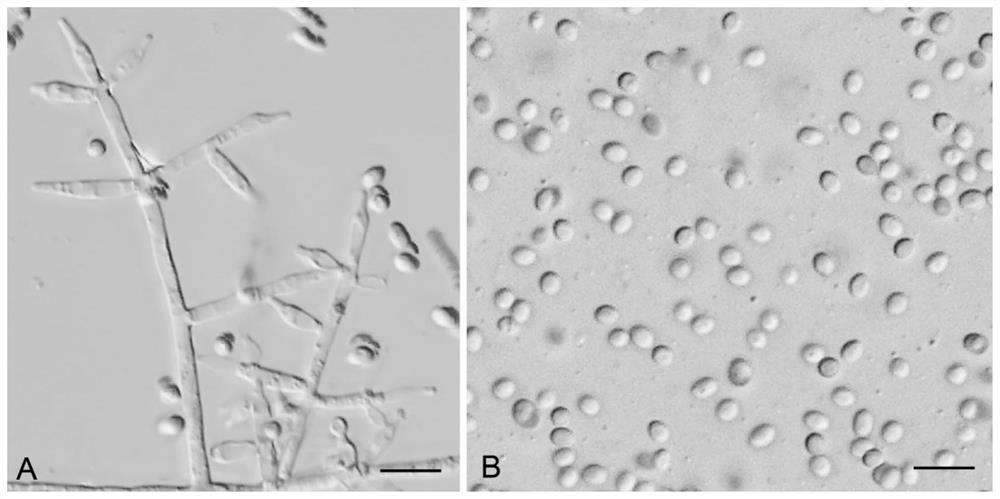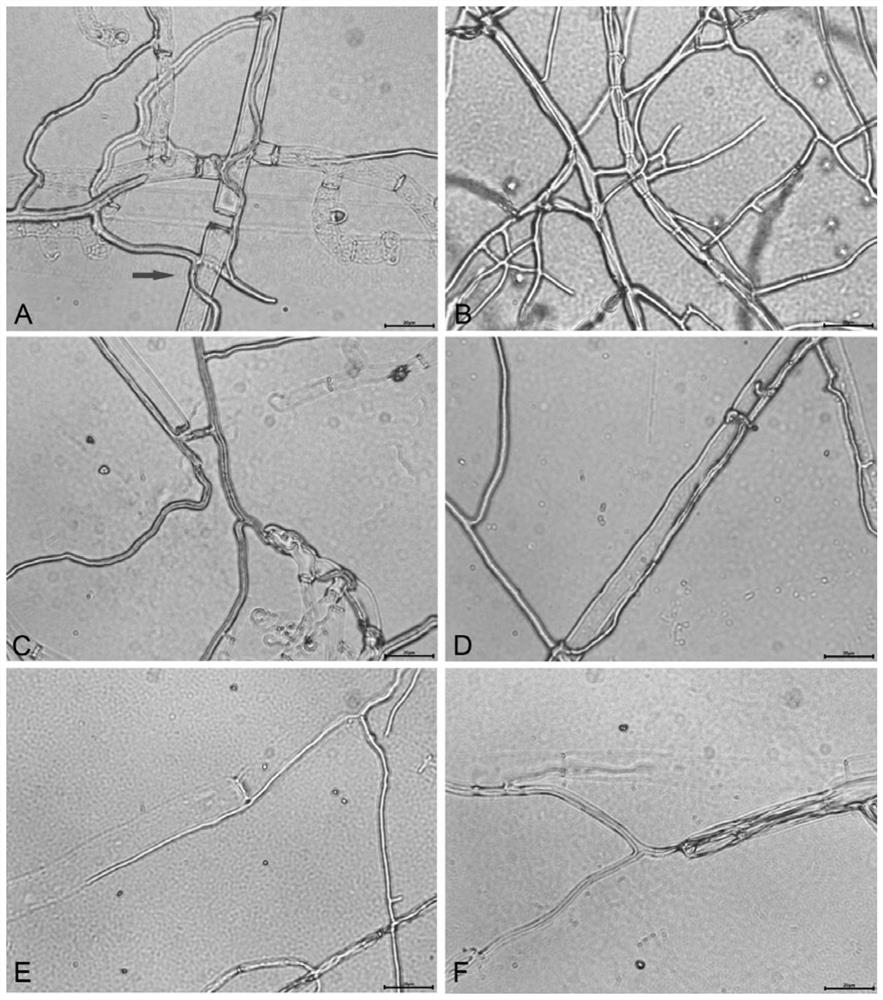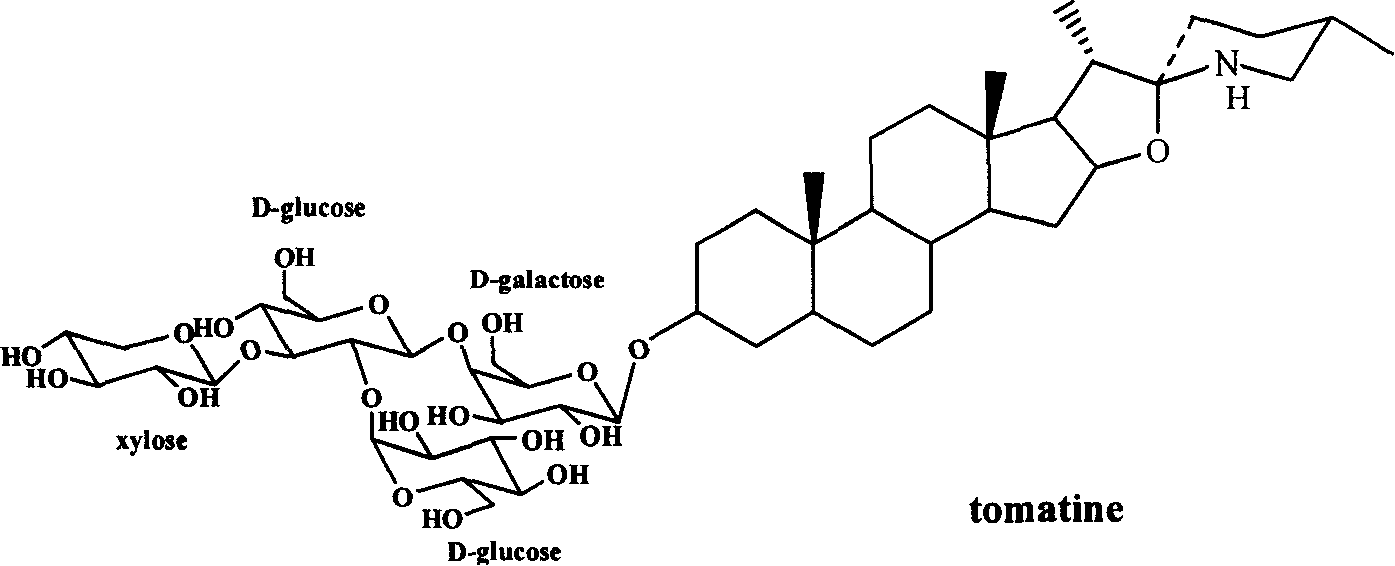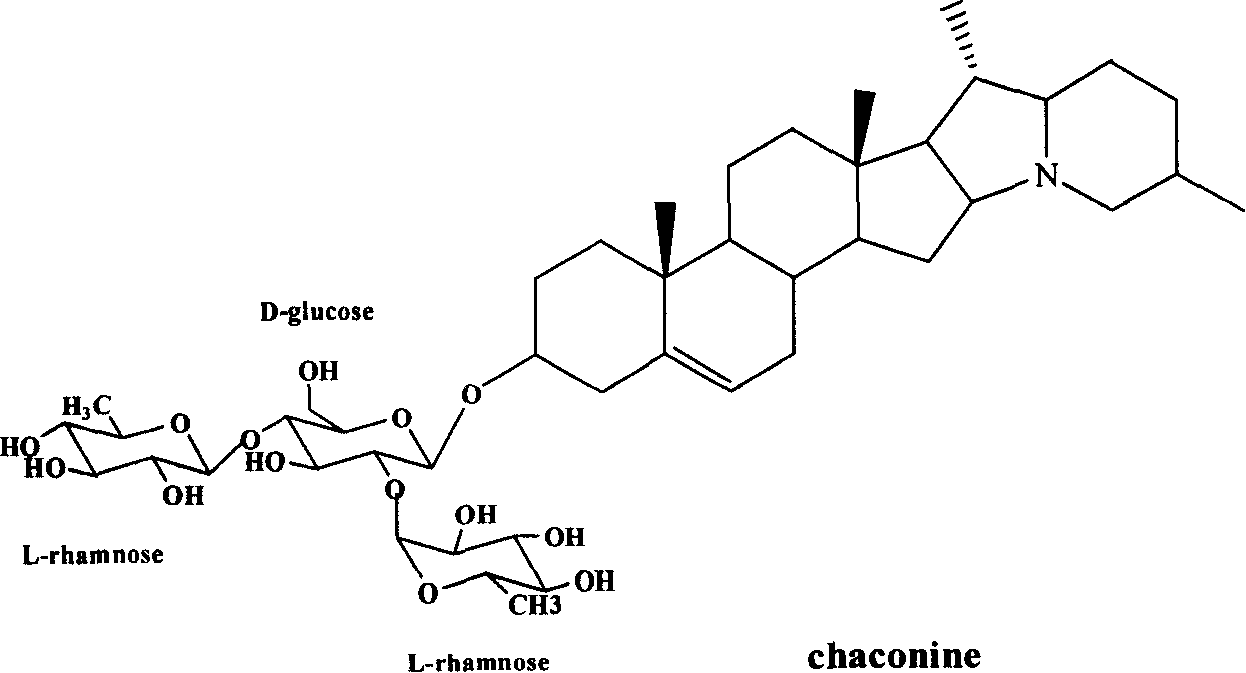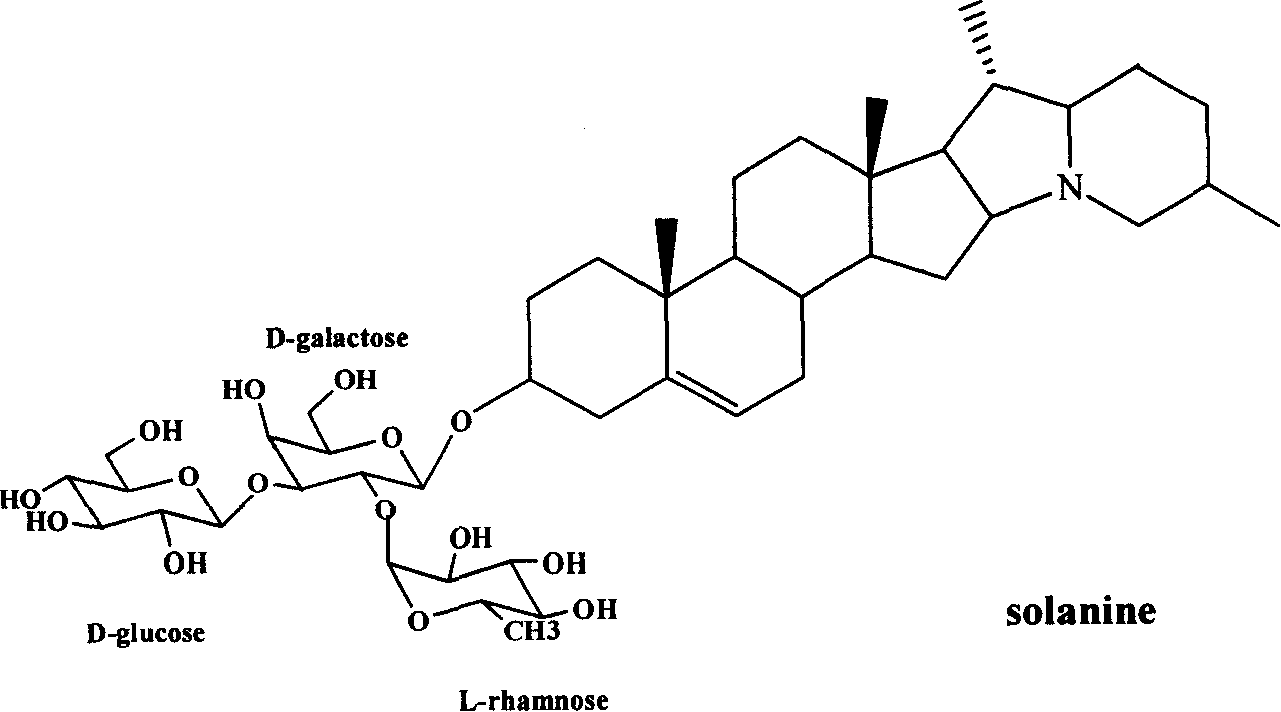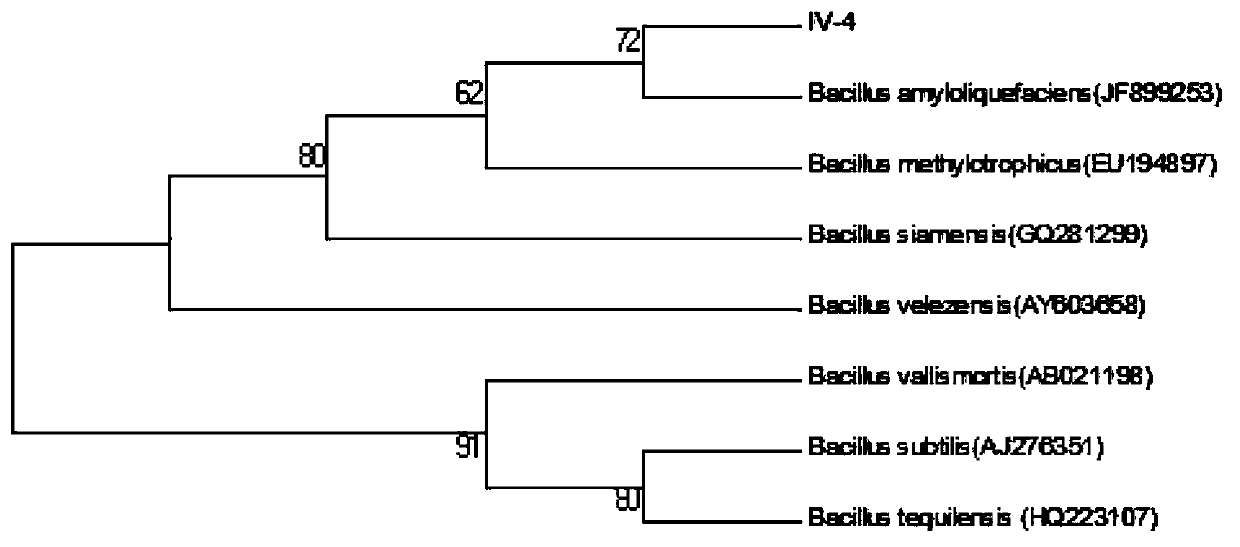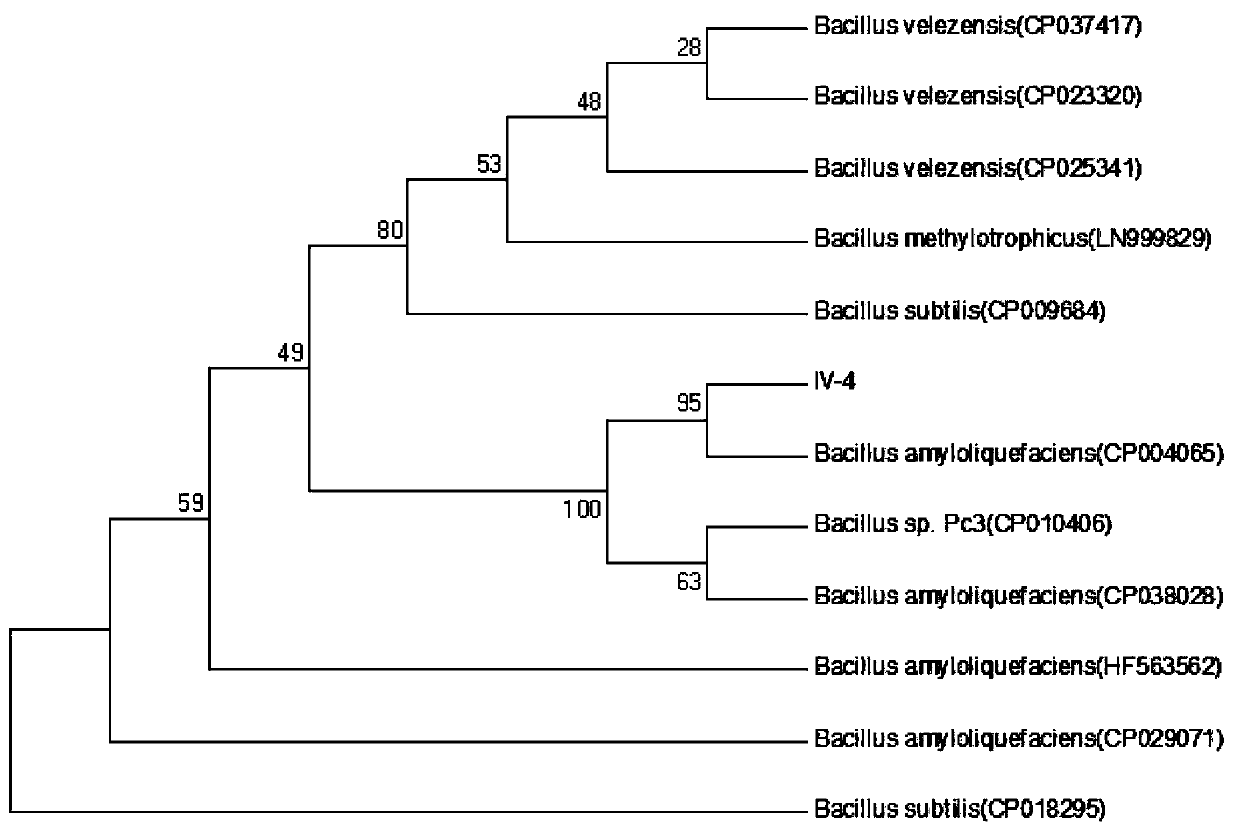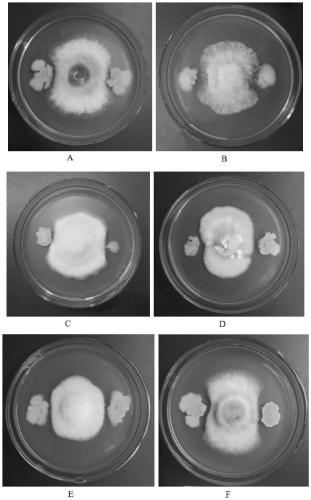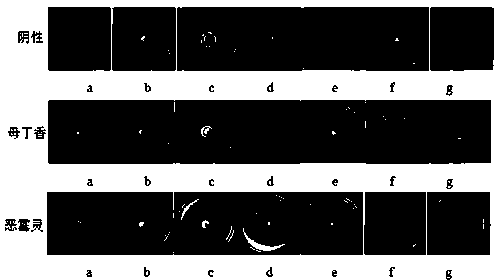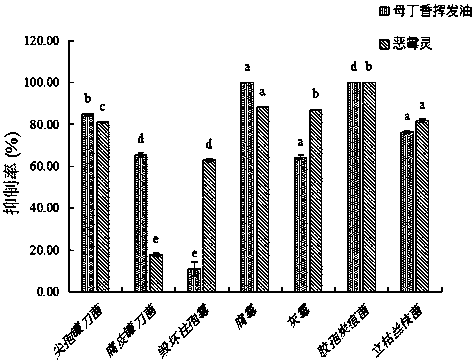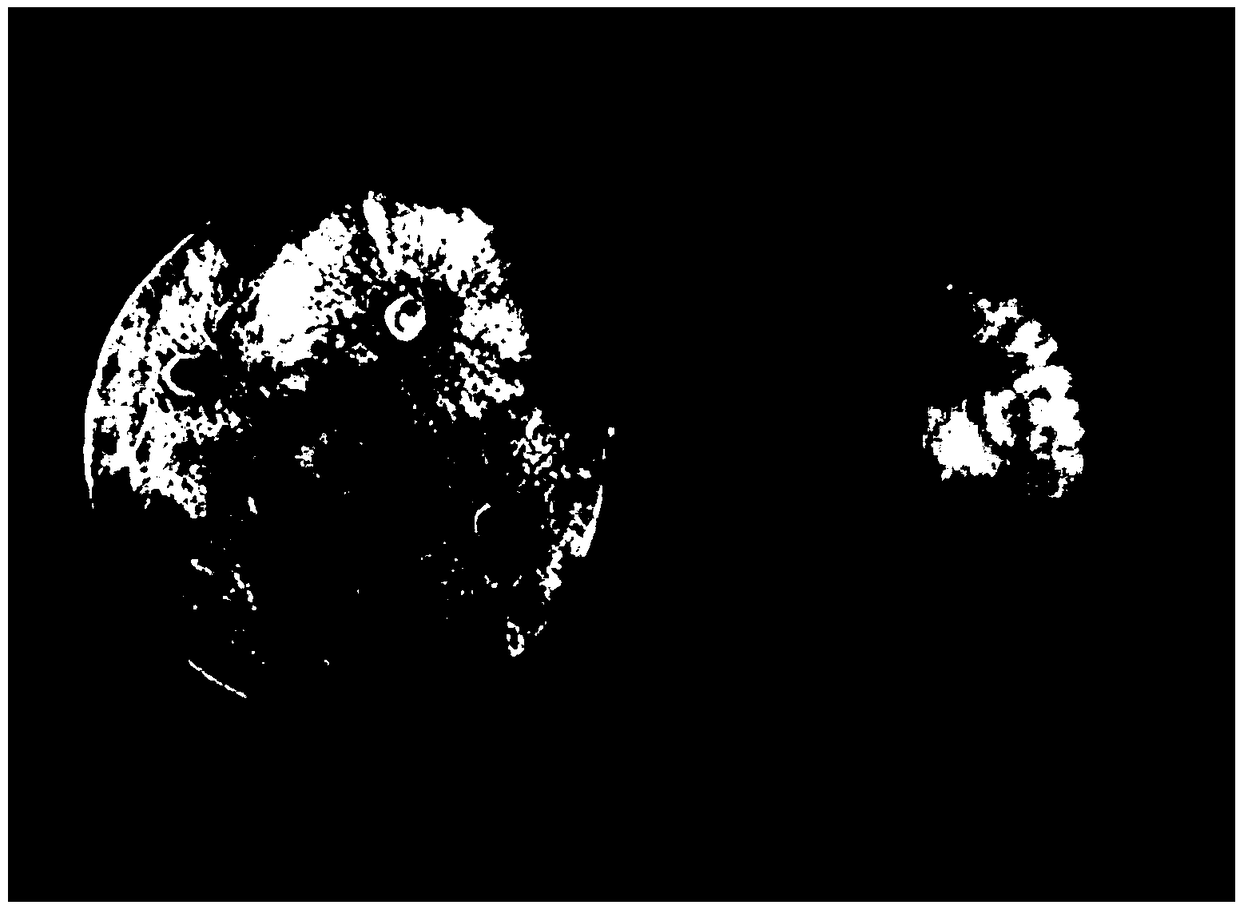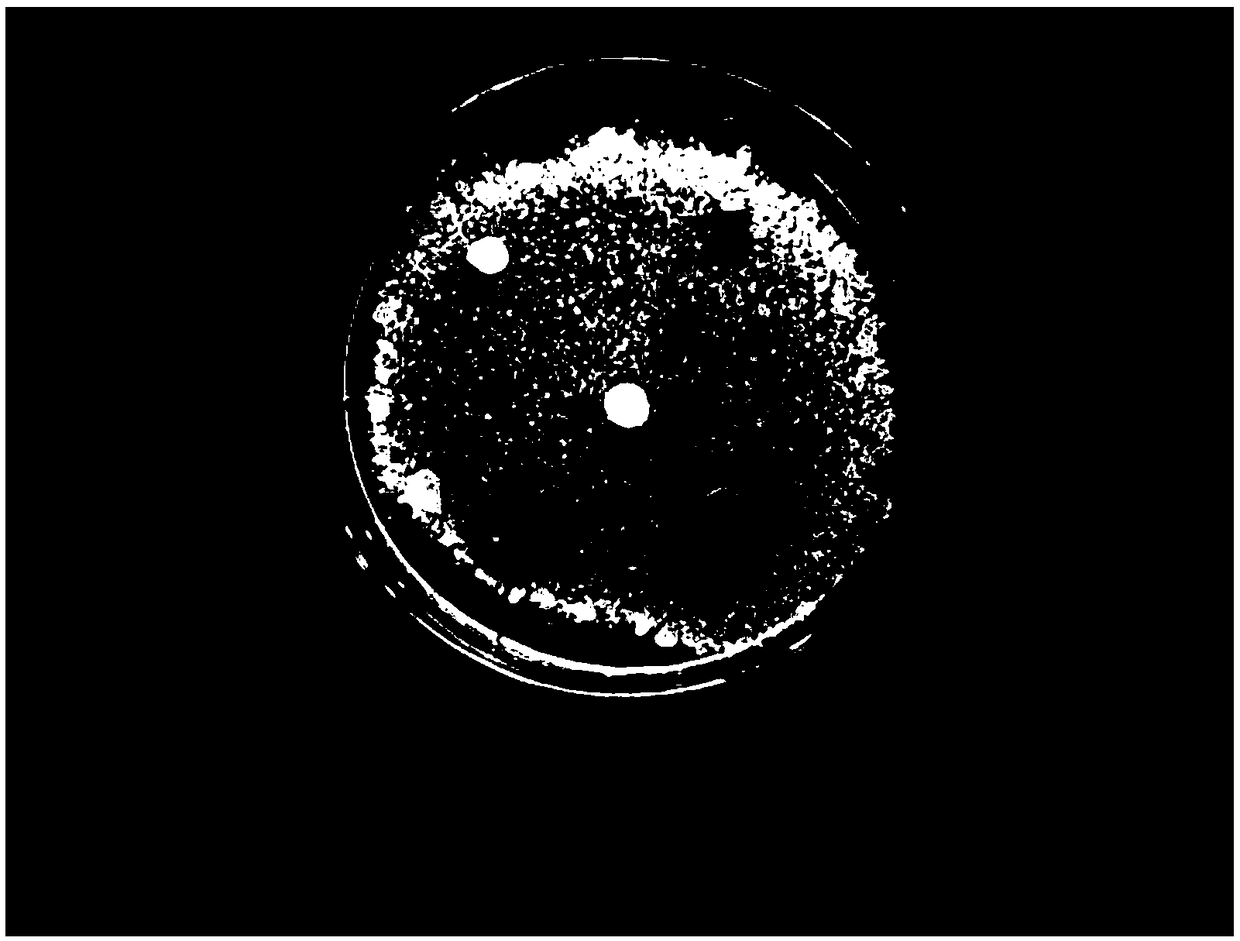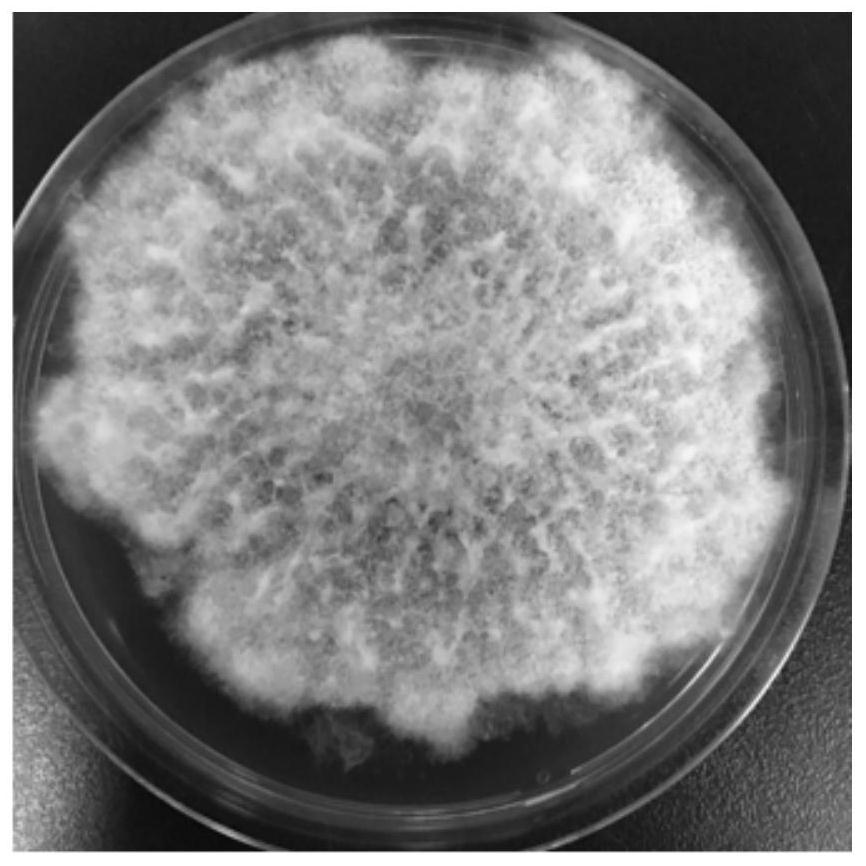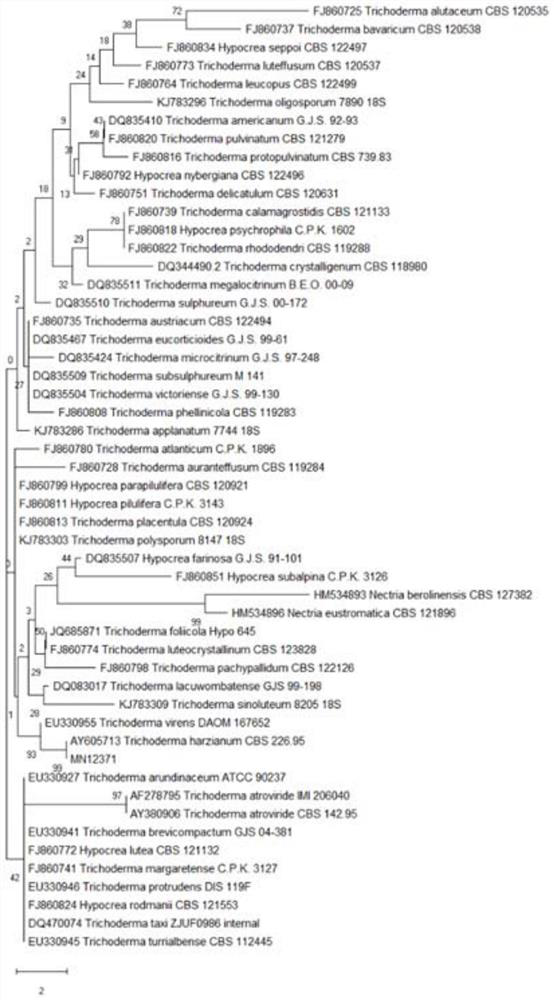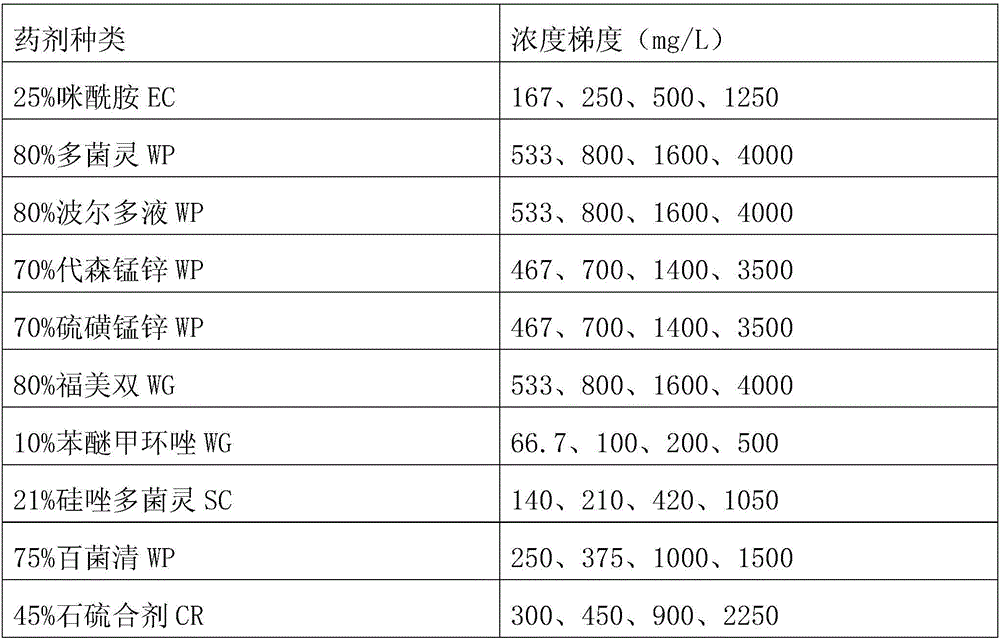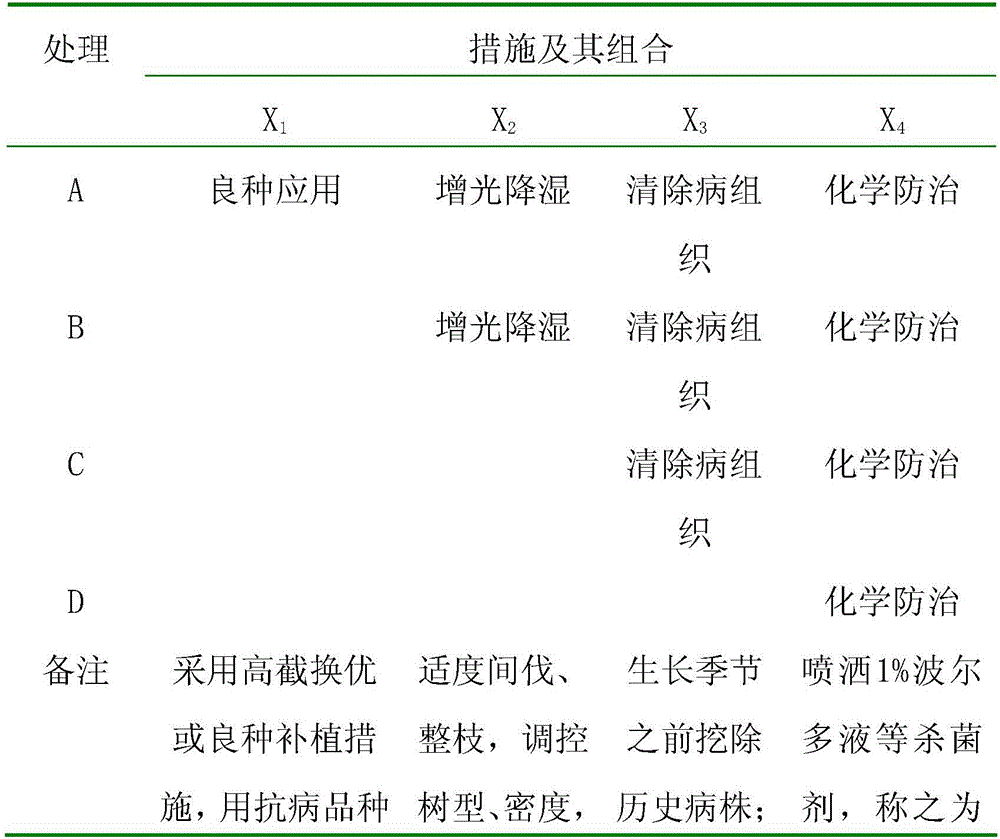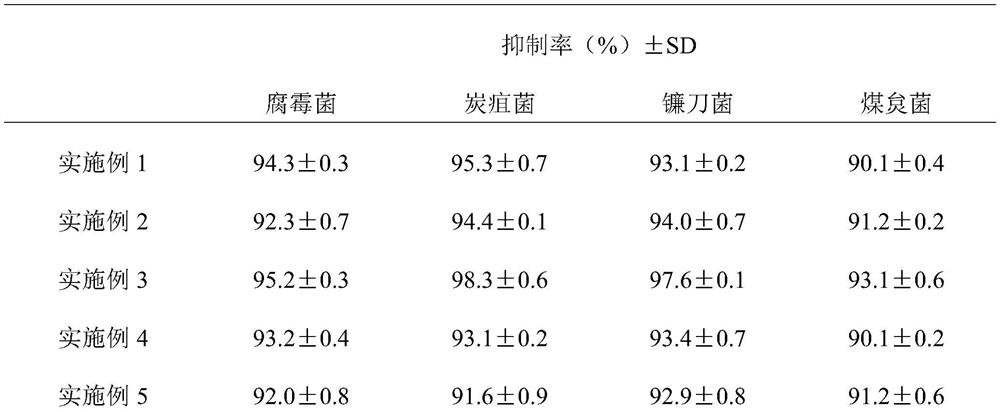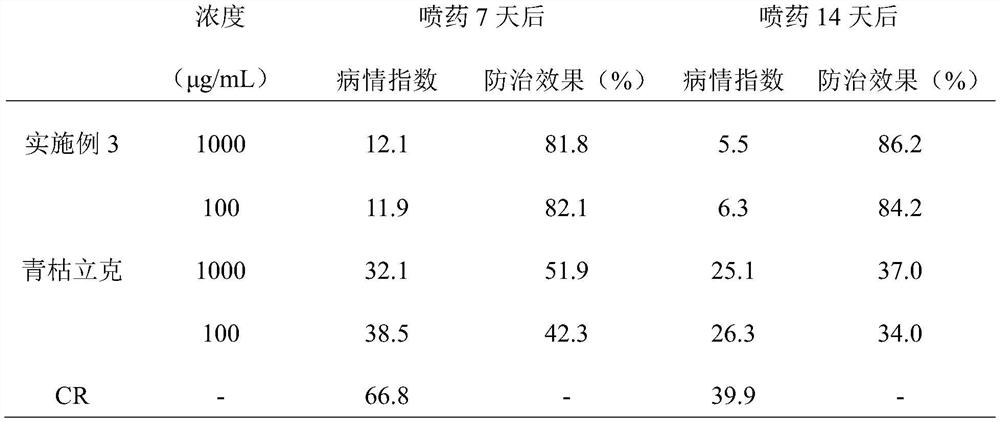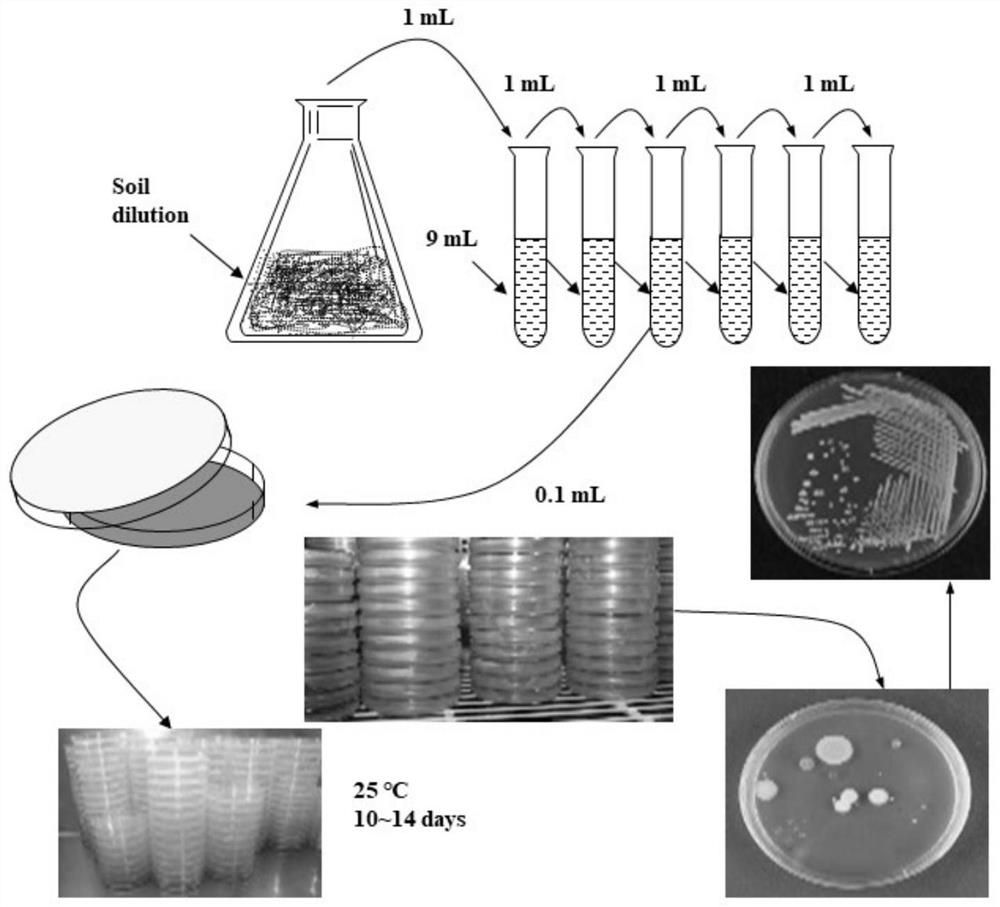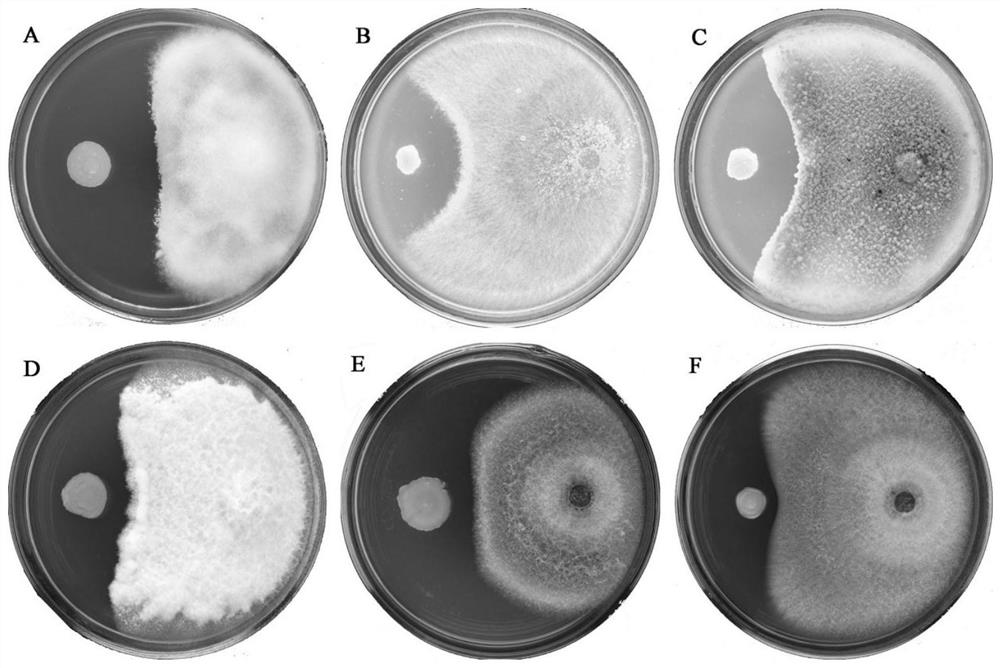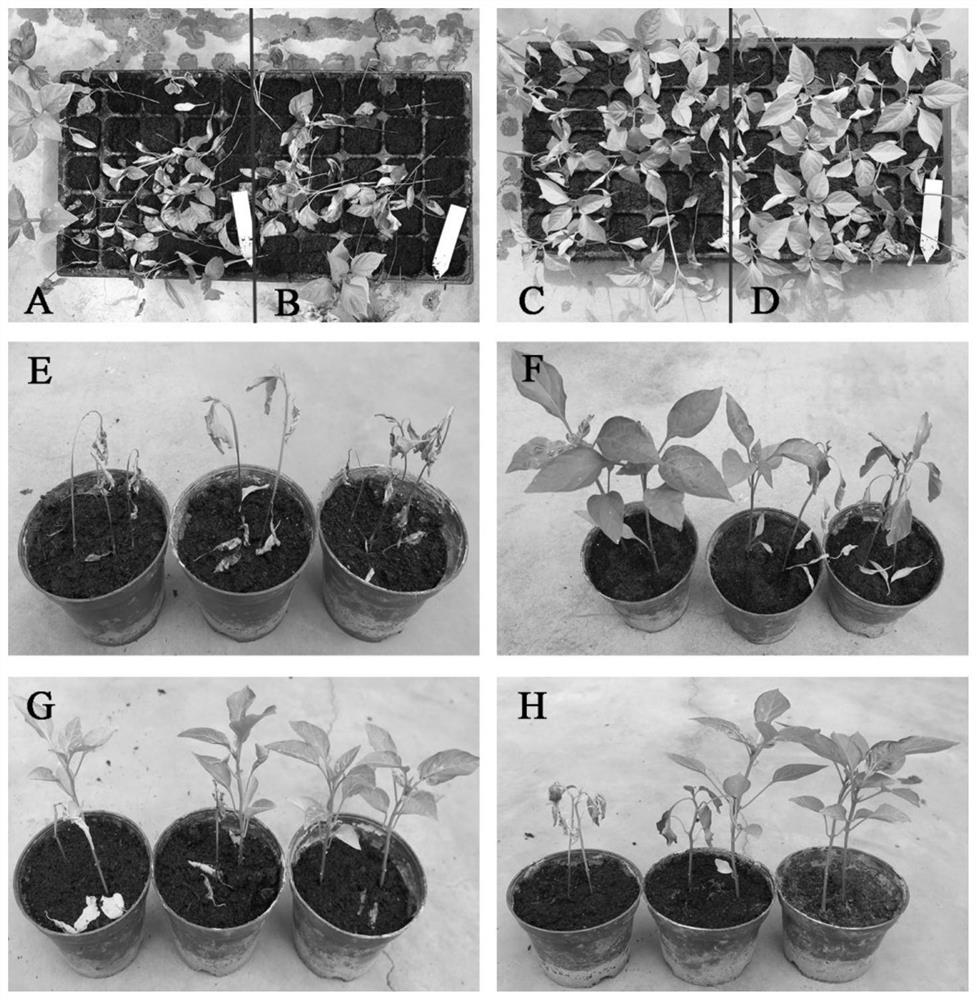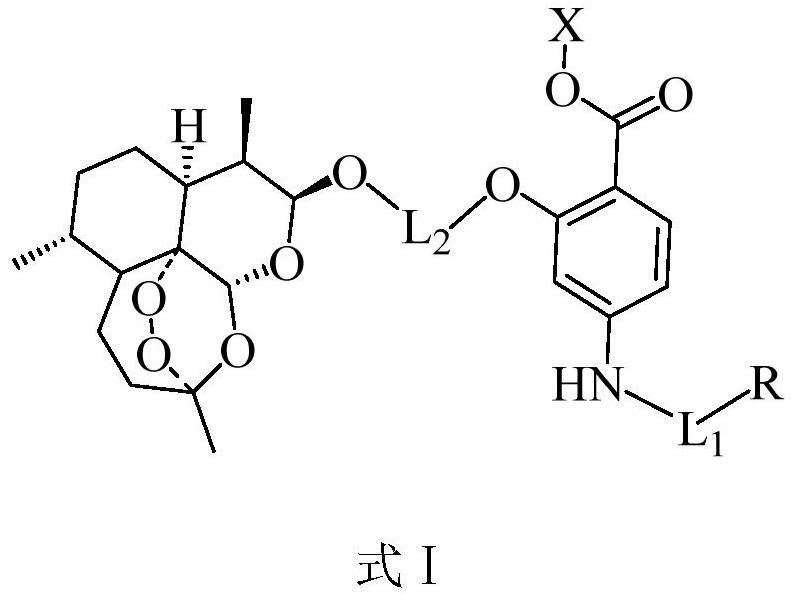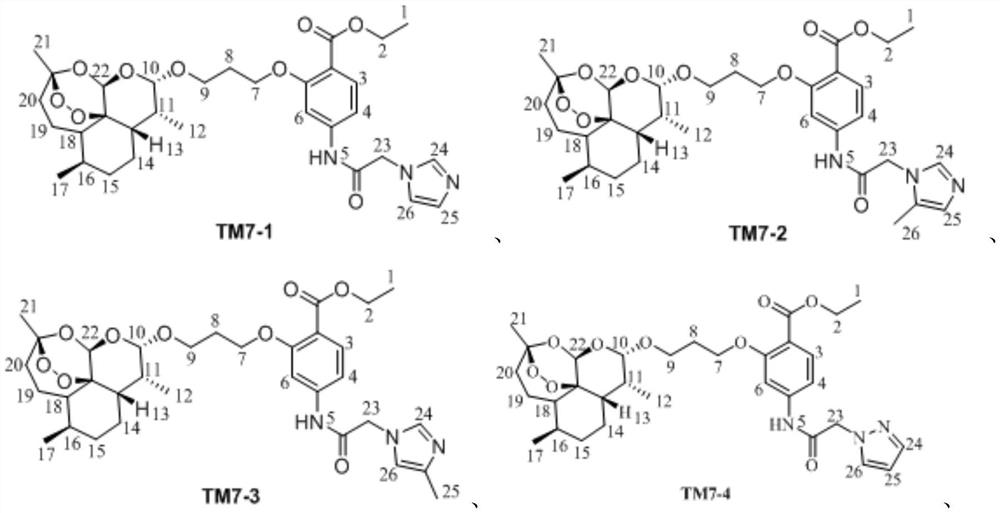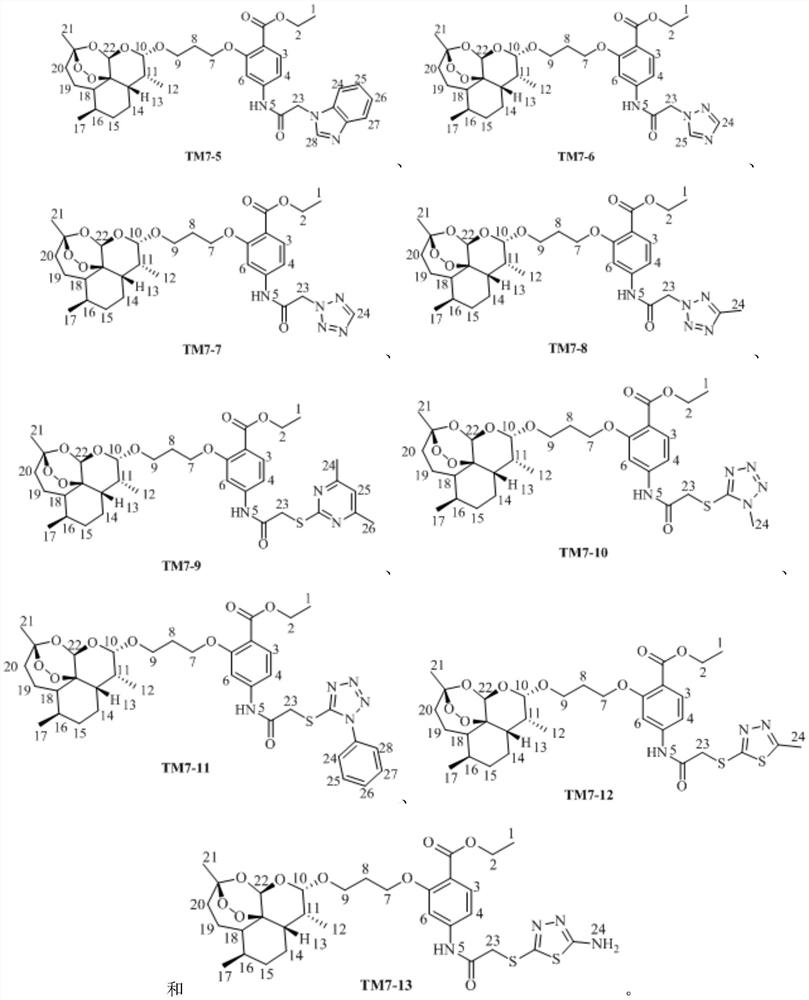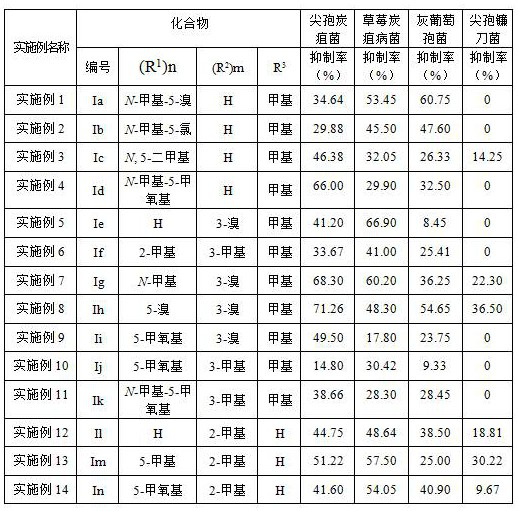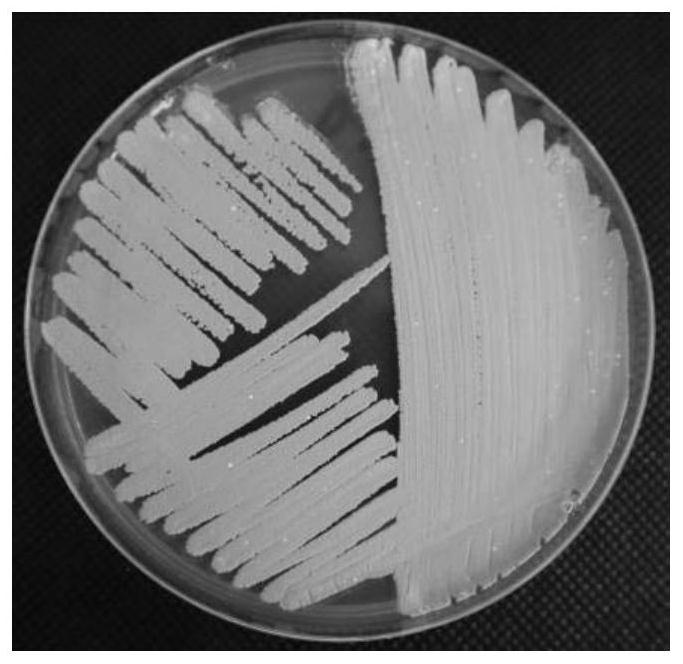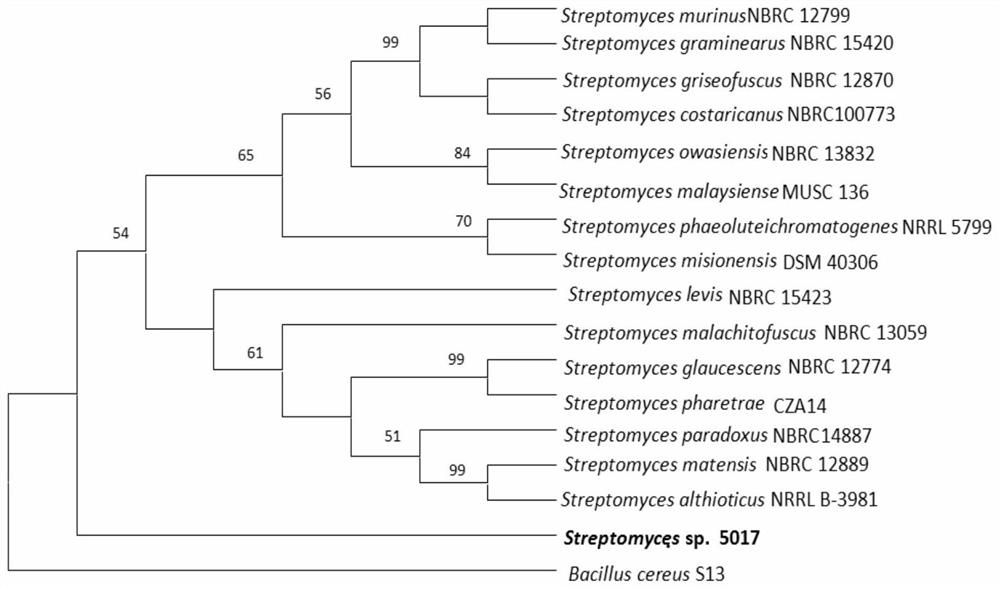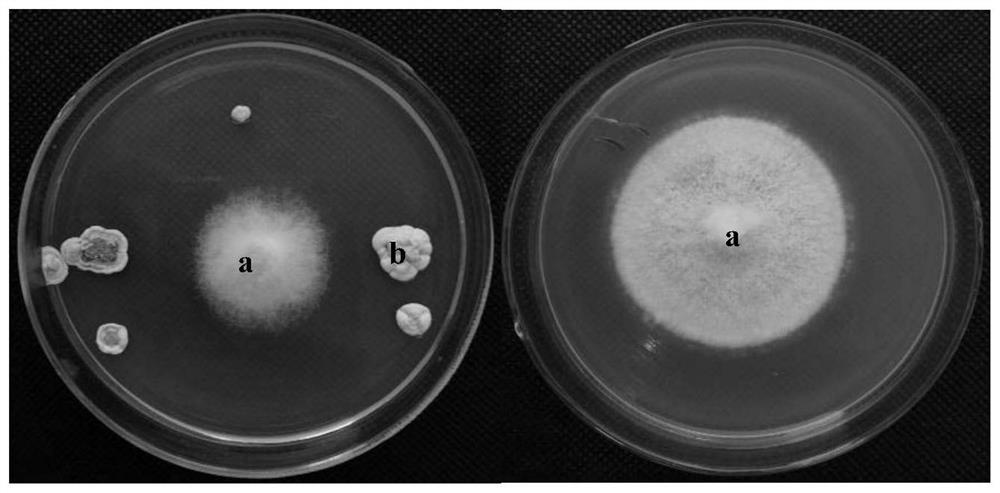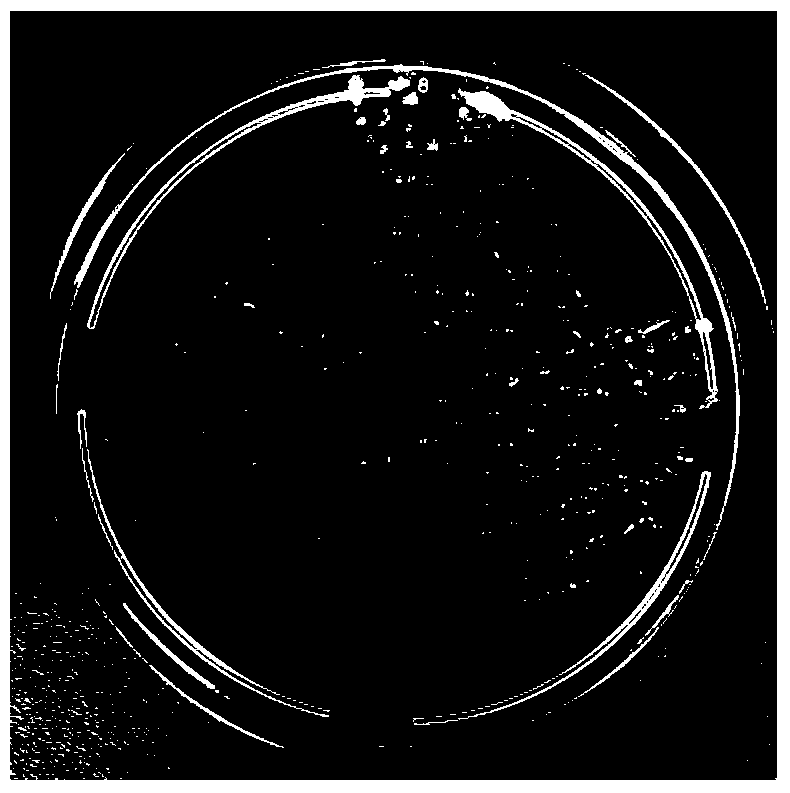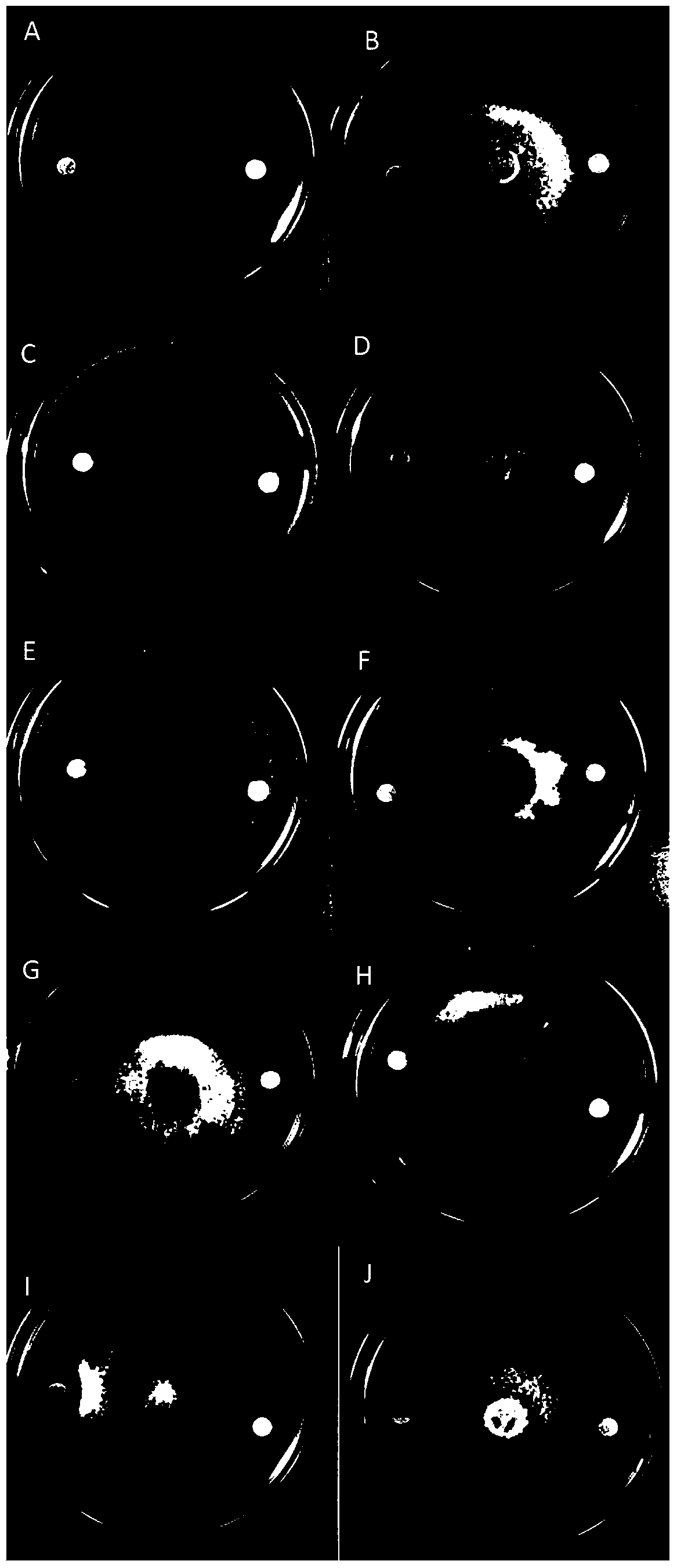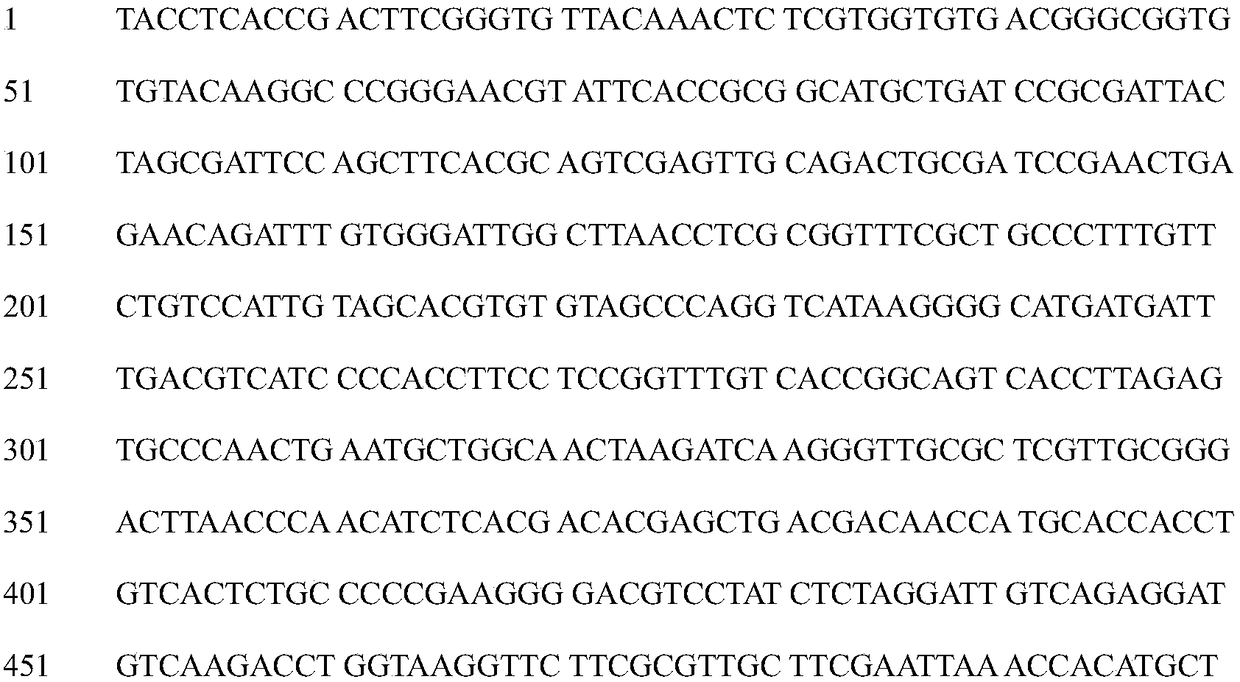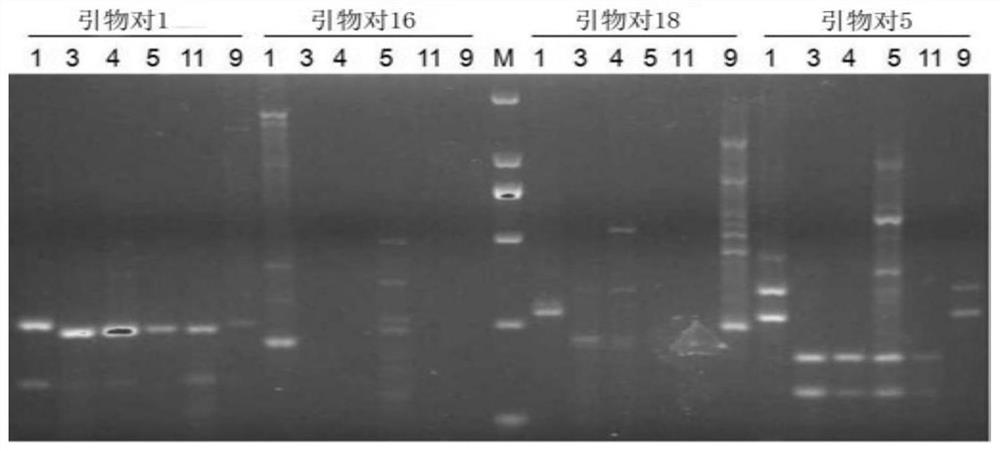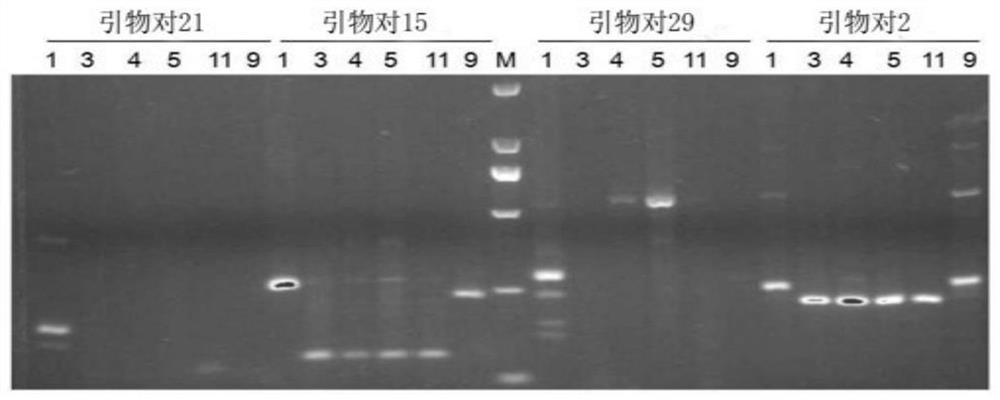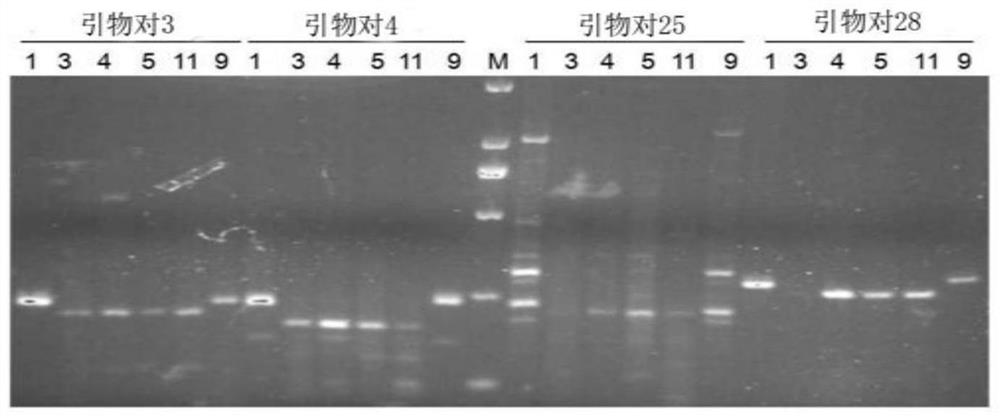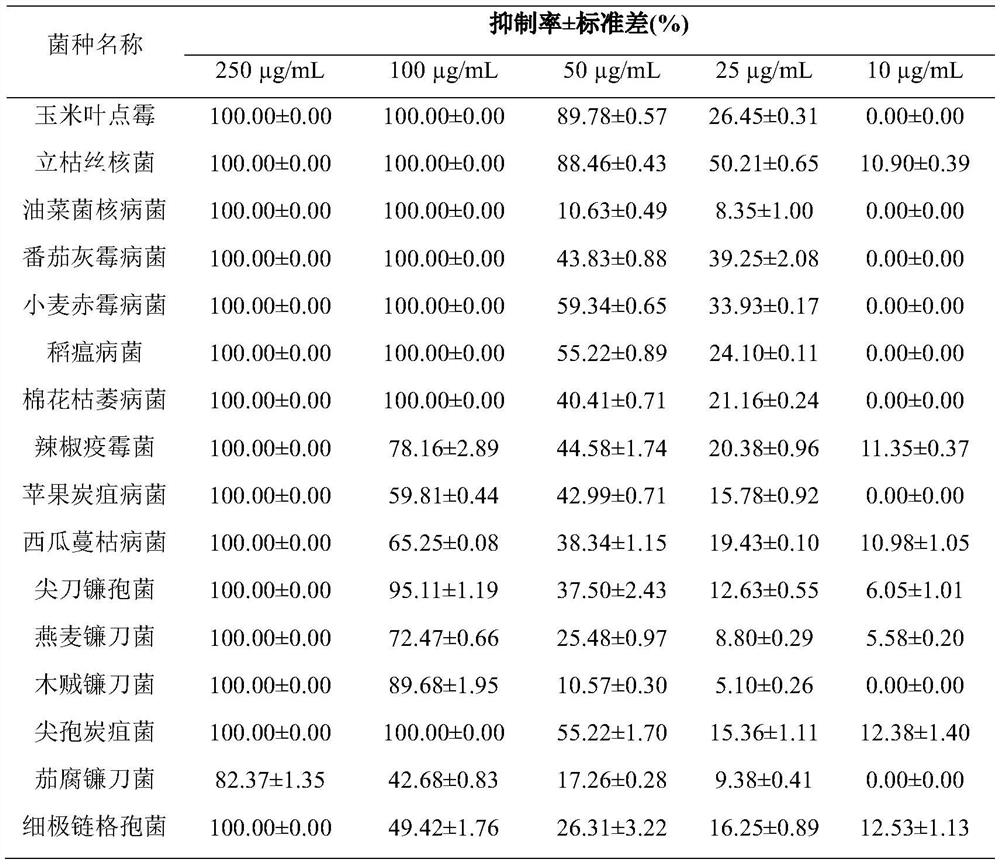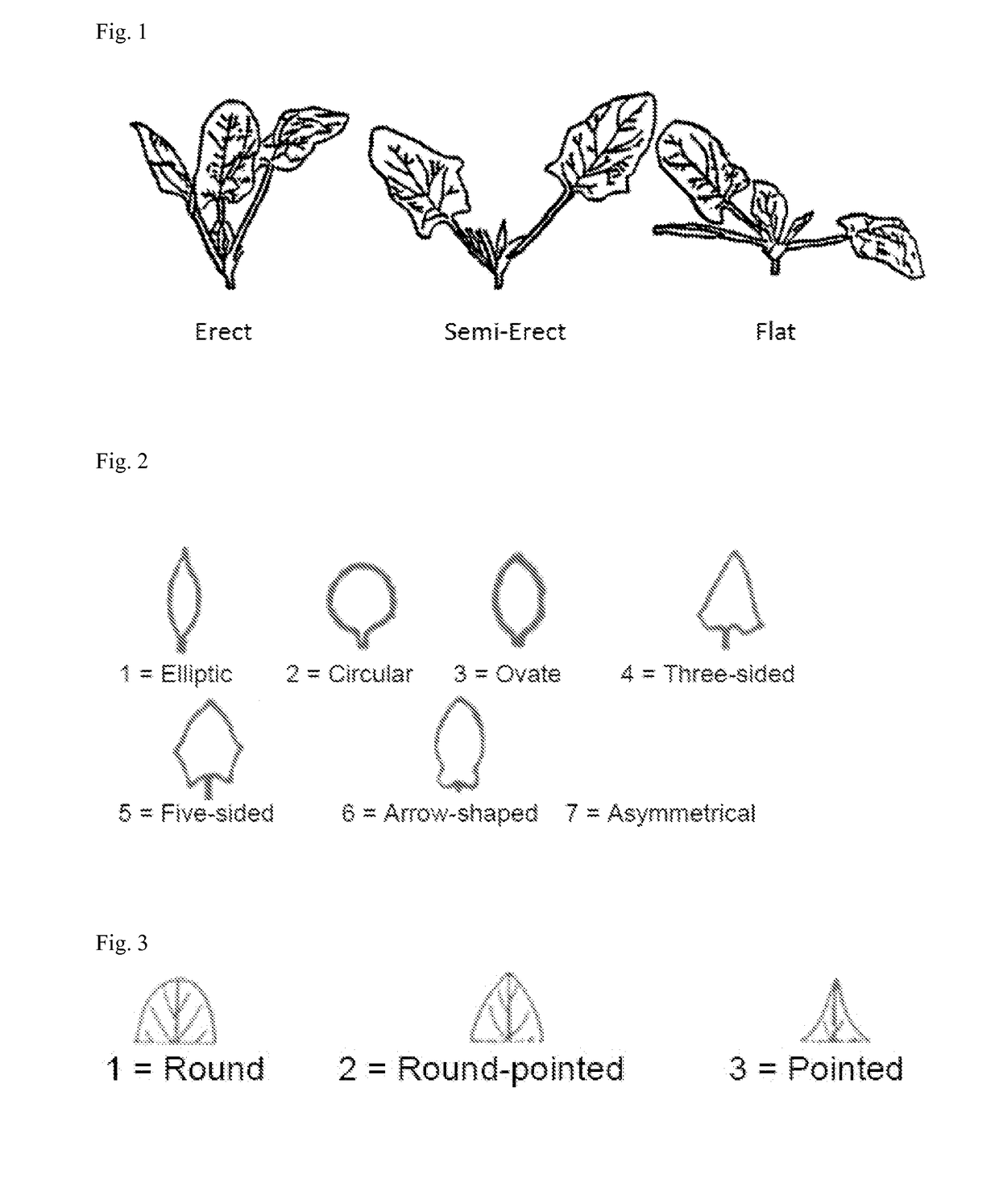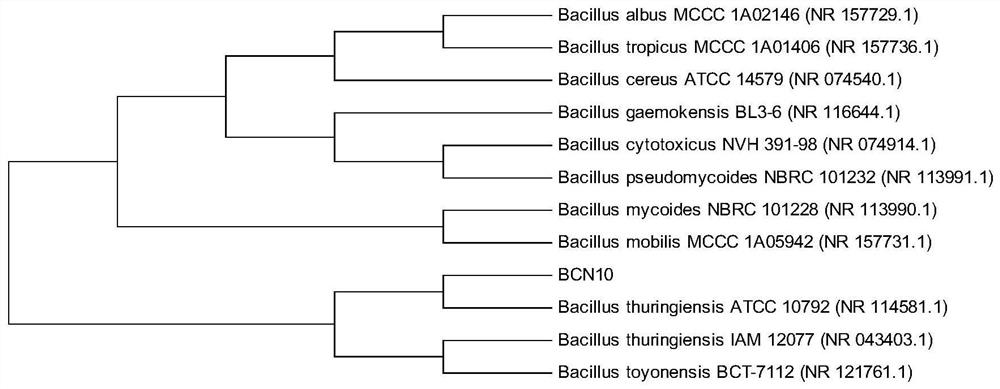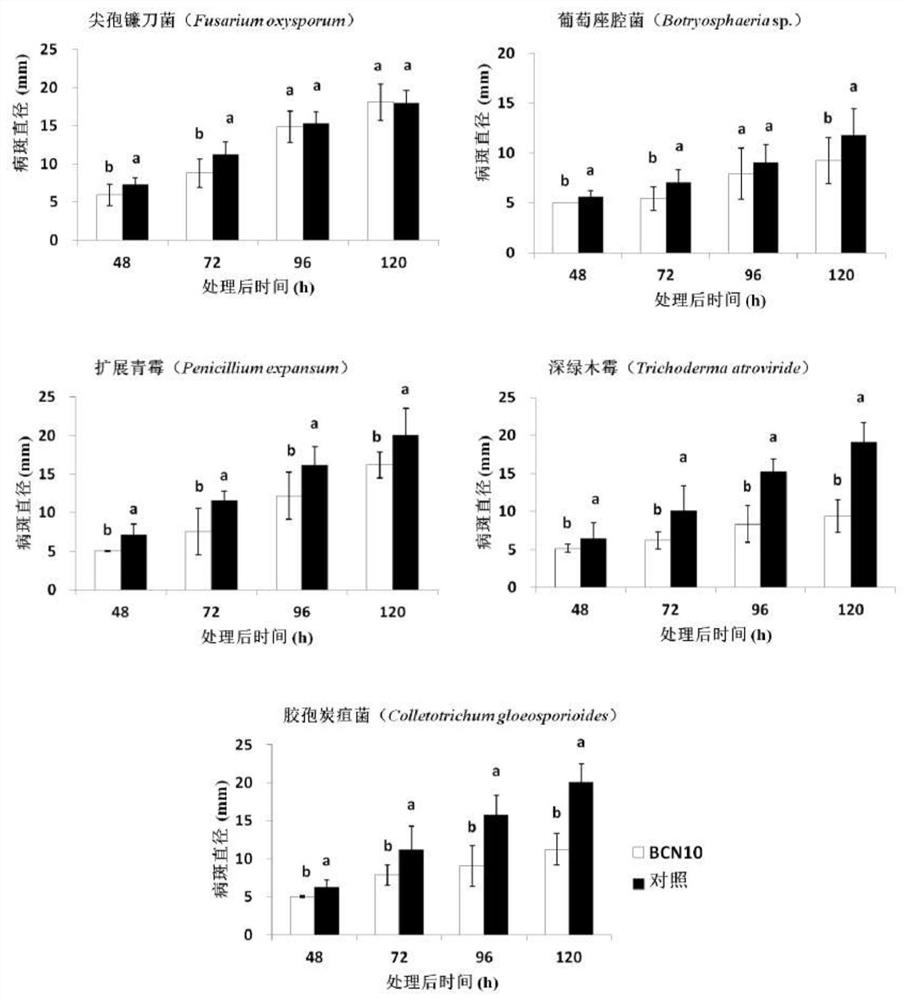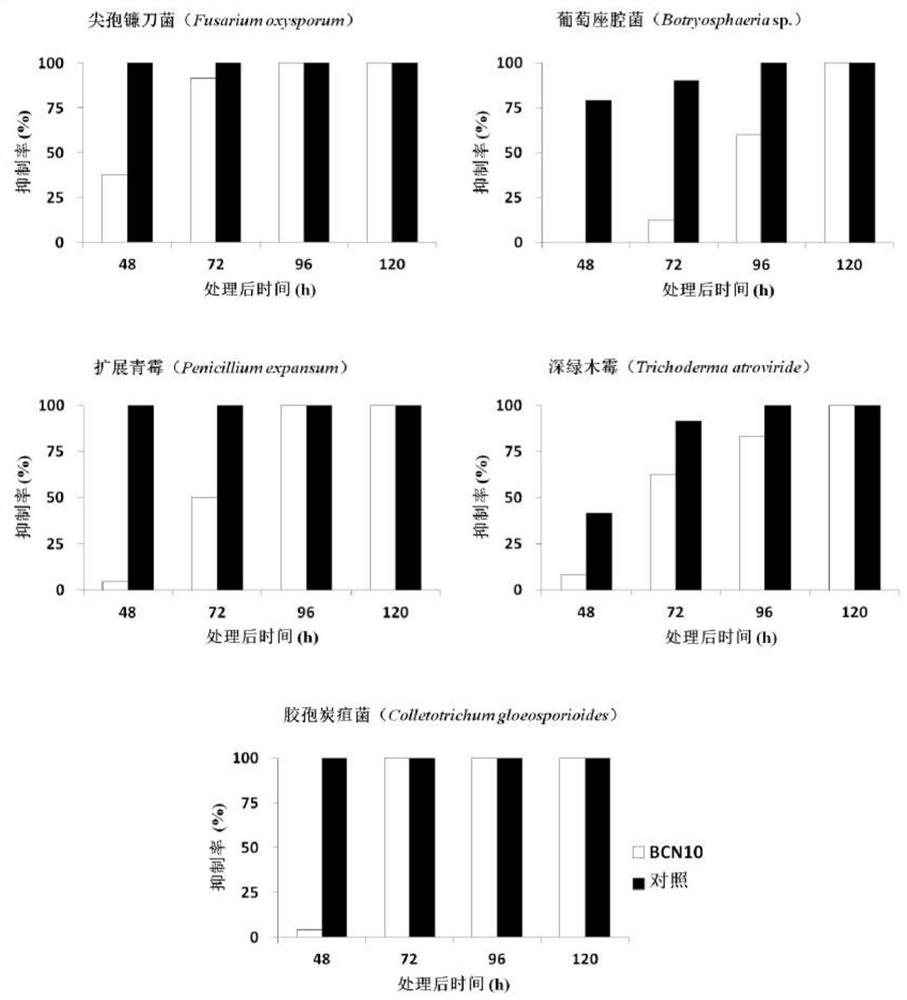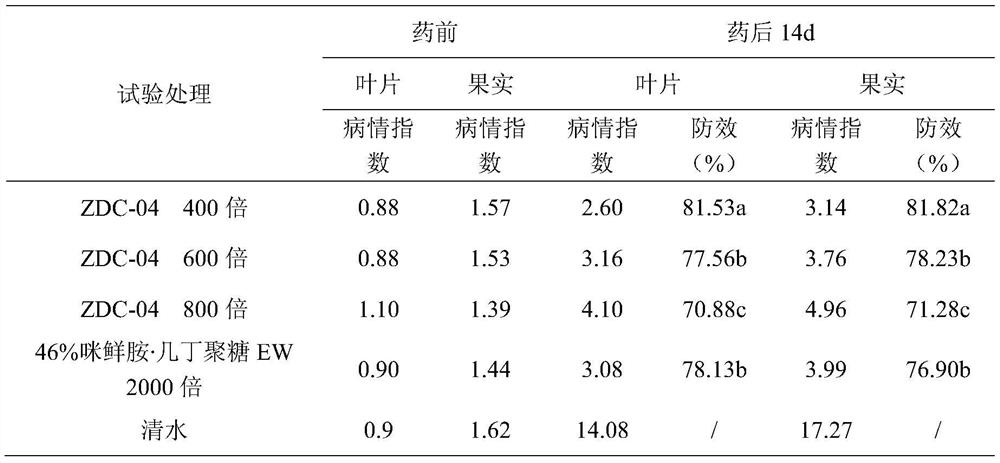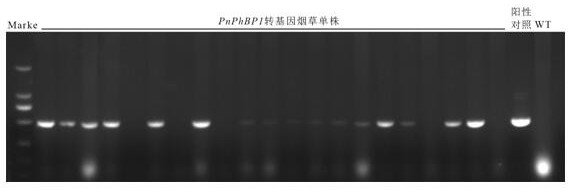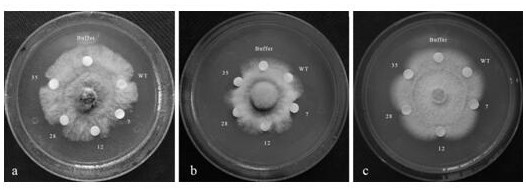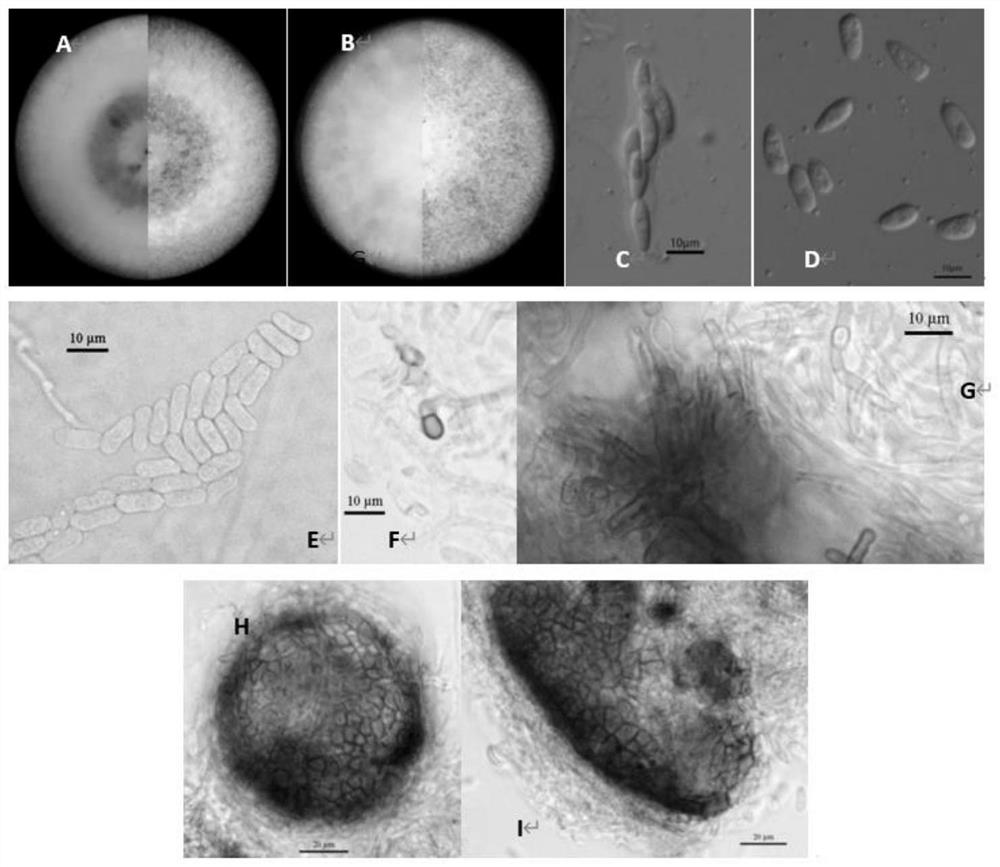Patents
Literature
Hiro is an intelligent assistant for R&D personnel, combined with Patent DNA, to facilitate innovative research.
43 results about "Colletotrichum dematium" patented technology
Efficacy Topic
Property
Owner
Technical Advancement
Application Domain
Technology Topic
Technology Field Word
Patent Country/Region
Patent Type
Patent Status
Application Year
Inventor
Colletotrichum dematium is a plant pathogen causing anthracnose.
Strain of efficient bacillus amyloliquefaciens, and bacterial agent and application thereof
ActiveCN108690821AGood inhibitory effectHigh inhibitory effectBiocideFungiDiseasePaecilomyces lilacinus
The invention discloses a strain of efficient bacillus amyloliquefaciens, and a bacterial agent and application thereof, wherein the Latin name of the bacillus amyloliquefaciens is Bacillus amyloliquefaciens; the strain number is HW05; the accession number of the bacillus amyloliquefaciens in China General Microbiological Culture Collection Center is CGMCC No. 10273. The efficient bacillus amyloliquefaciens provided by the invention has the obvious inhibition effects on fusarium oxysporum, phytophthora capsici, ralstonia solanacearum, pyricularia grisea, colletotrichum gloeosporioides and root-knot nematode. Through the single application of HW05, the efficient prevention and control effects can be achieved on leaf surface disease sweet melon powdery mildew, mango anthracnose diseases andmulberry red rust diseases; the HW05 and paecilomyces lilacinus can be matched for preventing and treating soil-borne banana wilting diseases and banana root-knot nematode diseases, and a good synergyeffect is achieved.
Owner:ENVIRONMENT & PLANT PROTECTION INST CHINESE ACADEMY OF TROPICAL AGRI SCI
Application and preparation of bacillus amyloliquefaciens subsp. plantarum and bacterial agent thereof
ActiveCN106591185ABroad antagonistic spectrumStable colonizationPlant growth regulatorsBiocide1-aminocyclopropanecarboxylic acidTriticeae
The invention relates to application and preparation of bacillus amyloliquefaciens subsp. plantarum and a bacterial agent thereof. An XH-9 bacterial strain is identified as bacillus amyloliquefaciens subsp. plantarum according to mycelial morphology, colony characteristics, physiological and biochemical indexes and 16S rDNA sequence analysis and is preserved in the China General Microbiological Culture Collection Center, and a preservation number is CGMCC NO.13151. The strain is high in antagonistic effect on pathogenic fungi such as fusarium oxysporum, bipolaris sorokiniana, fusarium pseudograminearum, colletotrichum gloeosporioides, botryosphaeria dothidea and alternaria alternata and is capable of generating heteroauxin and 1-aminocyclopropanecarboxylic acid (ACC) deaminase to stimulate plant growth and capable of degrading celluloses and can be stably colonized at rhizospheres of crops such as wheat, corn, peppers and the like. The bacterial agent prepared from the bacterial strain can be applied to prevention and treatment of root rot diseases or other soil-borne fungal diseases of crops such as wheat, corn, peppers and the like and has dual functions of disease prevention and growth promotion. The bacterial agent is simple in preparation process, short in fermentation period, low in cost and beneficial to industrial production and transport.
Owner:SHANDONG AGRICULTURAL UNIVERSITY
Broad-spectrum fungus-resistant bacillus and application thereof to preventing wheat scab
ActiveCN105132339AGood biological control effectConducive to pollution-free productionBiocideBacteriaPaecilomyces variotiiAlternaria
The invention discloses broad-spectrum fungus-resistant bacillus and application thereof to preventing wheat scab and relates to bacillus. The preservation number of the bacillus (Bacillus sp.)DY26-010 is CCTCC NO:M2015407. Supernatant liquid of the bacillus is antagonistic to fusarium spp, gloeosporium musarum, paecilomyces variotii, sclerotinia sclerotiorum, alternaria longipes, trichoderma viride, rhizoctonia, mutualism alternaria, botrytis cinerea and colletotrichum dematium. Fermentative supernatant liquid of the bacillus DY26-010 has high antagonism on pathogenic bacteria and fusarium spp of wheat scab, the preventing effect can be 57.1% in a potted experiment of wheat scab, and the bacillus can be used for preparing the fermentative supernatant liquid applied to preventing wheat scab. A biological prevention method of wheat scab is provided, no chemical pesticide is used, the bacillus has the advantages of being non-toxic, not prone to forming a pesticide-resistant environment, biologically safe and the like, and application prospects are good.
Owner:THIRD INST OF OCEANOGRAPHY STATE OCEANIC ADMINISTATION +1
Combined volatile compound and application thereof in preventing and treating anthracnose of postharvest mangos
The invention provides a combined volatile compound and application thereof in preventing and treating anthracnose of postharvest mangos. According to the invention, the application of the combined volatile compound in preventing and treating the anthracnose of the postharvest mangos is found for the first time. The combined volatile compound can act on colletotrichum mycelium and conidium by volatilization in a gas mode without contacting the fruits in a sealed environment to inhibit mycelia growth, conidia germination and disease speckle expansion; thus, an effect of preventing and treatingthe mango anthracnose is achieved. As the combined volatile compound is extremely easy to volatilize, the compound left on the surfaces of the mangos after steaming treatment is easy to volatilize; thus, an effect on mango quality and harm to human body health are reduced. The invention determines matching and use concentrations of 7 groups of different combined volatile compounds with an effect of preventing and treating the mango anthracnose. Compared with existing preservation chemicals, the combined volatile compound has the advantages of good preventing effect, low residue and very good development and application prospects.
Owner:INST OF PLANT PROTECTION GUANGXI ACADEMY OF AGRI SCI
Lysinibacillus sp. and application thereof, degumming auxiliary containing lysinibacillus sp. and preparation method of degumming auxiliary
InactiveCN105567605AAvoid large areas of growthQuality assuranceBacteriaMicroorganism based processesMicroorganismMicrobiology
The invention discloses lysinibacillus sp. and application thereof, a degumming auxiliary containing lysinibacillus sp. and a preparation method of the degumming auxiliary, belongs to the technical field of hemp degumming, and aims at solving the problems that in existing hemp rain and dew degumming, the consumed time is long, and the fiber damage is big. The lysinibacillus sp. Z39ay1 is preserved in the China General Microbiological Culture Collection Center, the preservation address is No.3 room, No.1 yard, beichen west road, Chaoyang District, Beijing, the preservation date is December 20, 2011, and the preservation number is CGMCC No.5618. The preparation method comprises the steps that 1, lysinibacillus sp. dqly-2 and colletotrichum dematium are picked to be cultured separately to obtain first-level seed solutions; 2, the seed solutions are cultured separately to obtain two fermentation solutions; 3, the two fermentation solutions are mixed, and tap water of which the volume is 5-8 times of that of the fermentation solutions is added. The degumming auxiliary is applied to hemp rain and dew degumming. Accordingly, the advantages of being low in cost, capable of rapidly achieving the effects, free of pollution and the like are achieved, the progress of hemp rain and dew degumming is accelerated, the quality of hemp fiber is improved, and the yield of the hemp fiber is increased.
Owner:DAQING BRANCH OF HEILONGJIANG ACAD OF SCI
A kind of hydroxylamine compound and preparation method thereof
InactiveCN102267965AEasy to prepareEasy to operateOrganic chemistryFungicidesBiotechnologyFusarium oxysporum
The present invention mainly provides a hydroxylamine compound and its preparation method which have inhibitory effects on Fusarium oxysporum, Fusarium moniliforme, Fusarium solani and anthracnose. Its chemical structural formula is: The plant disease caused by Fusarium oxysporum, Fusarium moniliforme, Fusarium solani and Anthracnose provides a new way, and the preparation method is simple, convenient and operable.
Owner:BIOLOGICAL TECH INST OF FUJIAN ACADEMY OF AGRI SCI +1
Trichoderma harzianum SQ-18 strain and application thereof to prevention and treatment of turfgrass diseases
ActiveCN112266879AHigh inhibition rateStrong antagonistic effectBiocideFungiDiseaseSecondary metabolite
The invention discloses a Trichoderma harzianum SQ-18 strain and application thereof to prevention and treatment of turfgrass diseases. The invention provides the Trichoderma harzianum SQ-18 strain which is preserved in Guangdong Microbial Culture Collection Center on July 26, 2018, and the preservation number of the Trichoderma harzianum SQ-18 strain is GDMCC No: 60422. The Trichoderma harzianumSQ-18 strain achieves an obvious inhibition effect on Rhizoctonia zeae, Laetisaria fuciformis, Botrytis cinerea, Colletotrichum hainanese and Rhizoctonia solani; secondary metabolites of the Trichoderma harzianum SQ-18 strain achieve a relatively strong antagonistic effect on Sclerotinia homoeocarpa, Nigrospora sphaerica and Laetisaria fuciformis; and the inhibition rate of a bacterium solution crude extract of the Trichoderma harzianum SQ-18 strain on the Sclerotinia homoeocarpa and the Bipolaris peregianensis is high. Therefore, the Trichoderma harzianum SQ-18 strain or the secondary metabolites or the bacterium solution crude extract of the Trichoderma harzianum SQ-18 strain has wide application prospects in prevention and treatment of diseases caused by turfgrass pathogenic bacteria orpreparation of turfgrass disease prevention and treatment preparations.
Owner:LINGNAN NORMAL UNIV
Application of glycoalkaloids as pesticides for controlling plant diseases
The present invention relates to farm chemical with glucoside alkaloid as the effective component for preventing and controlling plant mycosis and its application. The fungicidal glucoside alkaloid preparation has up to five kinds of glucoside alkaloid with obvious effect of preventing and controlling plant diseases caused by Verticillium, monospermous rust fungi, Fusarium and other fungi. The fungicidal glucoside alkaloid preparation has broad spectrum, low toxicity, environment friendship, low cost and other features.
Owner:NORTHEAST NORMAL UNIVERSITY
Antagonistic bacterium capable of increasing pH value of acid soil and preparation and application of microbial agent of antagonistic bacterium
The invention discloses an antagonistic bacterium capable of increasing the pH value of acid soil and preparation and application of a microbial agent of the antagonistic bacterium. The antagonistic bacterium is bacillus amyloliquefaciens and is preserved in the China General Microbiological Culture Collection Center, and the preservation number is CGMCC NO. 18619. The antagonistic bacterium has astrong antagonistic effect on pathogenic fungi such as fusarium oxysporum, bipolaris sorokiniana, fusarium graminearum, colletotrichum gloeosporioides, alternaria alternata and botryosphaeria dothidea, can be stably colonized at rhizosphere of plants such as wheat, corn, pepper and poplar, and can remarkably increase the pH value of the acid soil and promote crop growth. The microbial agent prepared from the antagonistic bacterium can be applied to improvement of growth of plants such as wheat, corn, pepper and poplar in the acid soil and prevention and control of fungal diseases, and has effects of increasing the pH value of the acid soil, preventing diseases and promoting growth; and the preparation process of the microbial agent is simple, the fermentation period is short, the cost islow, and industrial production and transportation are facilitated.
Owner:SHANDONG AGRICULTURAL UNIVERSITY
Yeast strain capable of antagonizing bacillus anthracis and applications thereof
The invention relates to a yeast strain capable of antagonizing bacillus anthracis and applications thereof, and belongs to the technical field of microbe application. The yeast strain (Saccharomycescerevisiae-MLB1) capable of antagonizing bacillus anthracis is obtained from nature through strain separation and culture. The yeast strain has been saved in China General Microbiological Culture Collection Center, CGMCC in Jan.6th,2014, and the preservation number is No. 8689. The yeast MLB1 strain is cultured in a malt extract medium, the culture product can antagonize bacillus anthracis, and the inhibition rate on fruit anthracnose is more than 75%.
Owner:YUNNAN UNIV
Application of fructus caryophylli volatile oil
The invention discloses application of fructus caryophylli volatile oil, namely, application of fructus caryophylli volatile oil to prevention of traditional Chinese medicinal herbe or crop root rot in the agriculture field or application to preventing and treating pathogenic bacteria which cause disease of the traditional Chinese medicinal herbse or the crops above the ground. The experimental result shows that fructus caryophylli volatile oil can inhibit and damage growth of hyphaeropes of 4 kinds of main pathogenic bacteria including fusarium oxysporum, fusarium solani, pythium and cylindrocarpon which cause occurrence of root rot of radix notoginseng, and can completely inhibit growth of hyphaeropes of 3 kinds of pathogenic bacteria including botrytis cinerea, colletotrichum dematium and rhizoctonia solani which cause occurrence of diseases of radix notoginseng above the ground. The antibacterial effect of the fructus caryophylli volatile oil is comparable to that of a chemical pesticide hymexazol, and fructus caryophylli and hymexazol have the synergistic effect on a plurality of bacterial strains when being compounded. The volatile oil has the features of being fragrant and capable of avoiding dirtiness because of the effumability of the volatile oil, therefore the fertilizer or the pesticide which isare developed based on the fructus caryophylli volatile oil will have the advantages of being safe, and effective and low residue.
Owner:YUNNAN UNIV OF TRADITIONAL CHINESE MEDICINE +1
Application of sarcandra glabra endophyte RJ-1 in inhibiting phytopathogens
InactiveCN109349276AEnhanced inhibitory effectPromote growthBiocideFungicidesEscherichia coliNicotiana tabacum
The invention discloses application of sarcandra glabra endophyte RJ-1 in inhibiting phytopathogens. The phytopathogens include colletotrichum dematium, notoginseng botrytis cinerea, notoginseng rootrot fungus, notoginseng alternaria brassicicola, notoginseng anthracnose, banana leaf spot fungus, banana anthracnose, banana oxysporum, cardamom leaf spot fungus, watermelon oxysporum, picria leaf spot fungus, curcuma kwangsiensis leaf spot fungus, tobacco grey mould fungus, blumea balsamifera brown spot fungus, momordica grosvenori leaf spot fungus or Escherichia coli. The sarcandra glabra endophyte RJ-1 has good inhibiting effect on various phytopathogens and has various antibacterial active substances, and a new way is provided for biological pesticide and natural antibacterial substance screening.
Owner:GUANGXI BOTANICAL GARDEN OF MEDICINAL PLANTS
A strain of Trichoderma and its application in agricultural field
ActiveCN109022292BEnhanced inhibitory effectImprove protectionFungiMicroorganism based processesBiotechnologyMicroorganism
Owner:MOON (GUANGZHOU) BIOTECH CO LTD
Pollution-free comprehensive prevention and control method for oil camellia anthracnose
ActiveCN105950702AConfiguration highPromote growthMicrobiological testing/measurementPlant protectionWater bathsCulture fluid
The invention discloses a pollution-free comprehensive prevention and control method for oil camellia anthracnose. The method includes the steps that 1, beef extract peptone is dissolved in a constant-temperature oscillation mode, wherein the water bath temperature is 80 DEG C, and due to the fact that the two substances are hard to dissolve, preparation of a culture solution can be accelerated in a heating oscillation mode; 2, the pH of the culture solution obtained in the step 1 is adjusted, the pH of the culture solution is adjusted to be 5.6, the pH is most suitable for growth of an anthrax strain, and the strain grows smoothly, wherein the inoculation mode of the strain obtained in the step 2 is a plate streak method, an inoculation method includes the plate streak method and a reverse plate method, due to the fact that the reverse plate method is prone to strain stacking to affect the experimental result, the plate streak method is adopted as a preferred method for strain inoculation, the culture temperature of the strain in the step 3 is 25 DEG C, the amount of agent poured every time in the step 4 is 5 ml, and in order to avoid the problems that the strain is killed at a time when too much agent is poured, and the effect is not obvious when too little agent is poured, and the dosage is adopted for the strain to be fed into medicine.
Owner:安徽德昌苗木有限公司
Morinda citrifolia sterilization preparation and preparation method thereof
ActiveCN113475534AHigh bactericidal activityImprove the effect of prevention and controlBiocideFungicidesBiotechnologyWasabia japonica
The invention provides a morinda citrifolia sterilization preparation and a preparation method thereof. The sterilization preparation is prepared from, by weight, 12-30 parts of adenophora trachelioides extracting solution, 10-25 parts of stellera chamaejasme extract, 8-15 parts of Eutrema yunnanense extract, 3-5 parts of semen lepidii oil and 0.3-1.5 parts of shikimic acid. All the raw materials are matched to achieve the antibacterial effect in a synergistic mode, and the sterilization preparation has high sterilization activity. The sterilization effects especially on pythium, anthracis, fusarium and Capnodiales fungus which all reach 90% or above, and also has high prevention and treatment effects on morinda citrifolia stem rot and anthracnose caused by the fungi, the prevention and treatment effects respectively reach 86.2% and 84.2% after 14 days, and the prevention and treatment effects on anthracnose reach 85.7% and 84.5% after 14 days.
Owner:HAINAN NORMAL UNIVERSITY
A strain of Paenibacillus terreus yc16-08 and its application
The invention belongs to the technical field of microorganisms, and specifically discloses a strain of Paenibacillus terreus YC16‑08 and its application. The preservation number of the Paenibacillus terreus YC16-08 is CGMCC No.16181. It has been found through experimental research that it is effective against Phytophthora capsici, Botrytis cinerea, Anthrax oxysporum, Rhizoctonia solani, Fusarium oxysporum, Both Fusarium solani and Verticillium have antagonistic effects. And the Paenibacillus terreus YC16-08 can produce siderophilic, amylase, protease, pectinase, cellulase, IAA and NH3, and has nitrogen fixing ability and phosphorus dissolving ability.
Owner:INST OF PLANT PROTECTION GANSU ACAD OF AGRI SCI
Uses of essential oil of mother clove
The invention discloses the use of volatile oil of clove; that is, its application in agriculture to prevent and treat root rot of Chinese medicinal materials or crops or to prevent and control pathogenic bacteria that cause diseases in the aboveground parts of Chinese medicinal materials or crops; experimental results It shows that the volatile oil of mother clove can inhibit the mycelial growth of the four main pathogenic bacteria Fusarium oxysporum, Fusarium solani, Pythium and Cylindrospora destroyer that cause root rot of Panax notoginseng, and can completely inhibit the growth of fungi that cause root rot of Panax notoginseng. The three kinds of pathogenic bacteria that occurred in some diseases inhibited the growth of mycelia of Botrytis cinerea, G. anthracnose and Rhizoctonia solani; The compounding of methazol has a synergistic effect on multiple strains; due to the volatile nature of volatile oil and its aromatic and anti-pollution characteristics, the chemical fertilizers or pesticides developed with it will have the advantages of safety, effectiveness, and low residue.
Owner:YUNNAN UNIV OF TRADITIONAL CHINESE MEDICINE +1
P-aminosalicylic acid dihydroartemisinin derivative as well as preparation method and application thereof
ActiveCN112094279ANovel structureHigh antibacterial activityAntibacterial agentsAntimycoticsAntifungalCitrus volkameriana
The invention discloses a p-aminosalicylic acid dihydroartemisinin derivative as well as a preparation method and application thereof, and belongs to the technical field of drug synthesis. The structural formula of the p-aminosalicylic acid dihydroartemisinin derivative is shown in the specification. An in-vitro antibacterial activity determination result shows that the overall antibacterial activity of the target compound is relatively good; an in-vitro antifungal activity determination result shows that the target compound has good antibacterial activity on pichia pastoris as a whole; citruspathogen resistance activity determination results show that the compound has inhibitory activity on colletotrichum gloeosporioides, citrus brown blotch bacteria and citrus canker pathogens; the anti-mycobacterium smegmatis activity determination result shows that the inhibition activity of the intermediates IM1'and IM2 'is very good. Therefore, it is proved that the p-aminosalicylic acid dihydroartemisinin derivative and the intermediate thereof have potential application prospects in the fields of bacterium resistance, fungus resistance, citrus pathogen resistance and tuberculosis resistance.
Owner:SOUTHWEST UNIVERSITY
A kind of indole methyl aniline compound and application thereof
InactiveCN108892634BEasy to makeHigh antibacterial activityBiocideOrganic chemistryMethylanilineAntifungal
The invention discloses an indolemethylaniline compound and its application, specifically a substituted 4‑((1 H ‑indol‑3‑yl)methyl)‑ N ‑Methylaniline compounds and their applications. The compound is simple to prepare and exhibits good antifungal activity. The present invention adopts the method of potato agar containing medicine (PDA) to carry out the fungal anthracnose oxysporum and strawberry anthracnose to the synthesized compound 、 Botrytis cinerea 、 The bactericidal activity assay of Fusarium oxysporum, all compounds of embodiment 1~14 are to anthracnose oxysporum, strawberry anthracnose 、 Botrytis cinerea all showed certain inhibitory activity, and some compounds also had certain inhibitory effect on Fusarium oxysporum.
Owner:ZHEJIANG UNIV OF TECH +1
Streptomyces 5017 and its application in antagonizing plant pathogens
ActiveCN110628687BControl Fusarium WiltImprove disease resistanceBiocideBacteriaBiotechnologyAlternaria
The invention discloses a strain of Streptomyces sp. B5017, which is characterized in that the preservation number is CCTCC NO: M2019648 and the classification name is Streptomyces sp. B5017. Tests show that the new marine-derived Streptomyces strain of the present invention has the effect of antagonizing various plant pathogenic bacteria, and is effective against banana anthracnose, mango anthracnose, pearl anthracnose, Phytophthora vinifera, and Fusarium oxysporum No. 4 race. , Banana Fusarium oxysporum No. 1 race or Alternaria have inhibitory effect. The fermented liquid prepared by Streptomyces 5017 of the present invention can effectively avoid the yellowing and wilting of leaves caused by Fusarium oxysporum No. 4 and No. 1 races in pot experiments, which proves that the Streptomyces 5017 can effectively prevent and treat banana fusarium wilt, It has good ecological and social benefits to enhance the disease resistance of bananas, and has a good application prospect as a biocontrol preparation.
Owner:GUANGXI ACAD OF SCI
A Broad Spectrum Antifungal Bacillus and Its Application in Controlling Wheat Scab
InactiveCN105132339BGood biological control effectConducive to pollution-free productionBiocideBacteriaPaecilomyces variotiiAlternaria
The invention discloses broad-spectrum fungus-resistant bacillus and application thereof to preventing wheat scab and relates to bacillus. The preservation number of the bacillus (Bacillus sp.)DY26-010 is CCTCC NO:M2015407. Supernatant liquid of the bacillus is antagonistic to fusarium spp, gloeosporium musarum, paecilomyces variotii, sclerotinia sclerotiorum, alternaria longipes, trichoderma viride, rhizoctonia, mutualism alternaria, botrytis cinerea and colletotrichum dematium. Fermentative supernatant liquid of the bacillus DY26-010 has high antagonism on pathogenic bacteria and fusarium spp of wheat scab, the preventing effect can be 57.1% in a potted experiment of wheat scab, and the bacillus can be used for preparing the fermentative supernatant liquid applied to preventing wheat scab. A biological prevention method of wheat scab is provided, no chemical pesticide is used, the bacillus has the advantages of being non-toxic, not prone to forming a pesticide-resistant environment, biologically safe and the like, and application prospects are good.
Owner:THIRD INST OF OCEANOGRAPHY STATE OCEANIC ADMINISTATION +1
The ssr primer pair of persimmon anthracnose based on the genome of related species and its application
ActiveCN106701943BEffective prevention and controlMicrobiological testing/measurementMicroorganism based processesBiotechnologyMicrobiology
The invention belongs to the field of biotechnology, and specifically discloses a set of SSR primer pairs for persimmon anthracnose fungus developed based on the genome of a related species and an application thereof. The SSR primer pair of the persimmon anthracnose fungus is based on the genome of a close relative of the persimmon anthracnose fungus—the fruit-bearing anthracnose fungus, and 30 pairs of SSR primers have been developed through MISA software. The screening of pathogens has obtained 15 pairs of SSR primers with polymorphisms. The primers for Kaki anthracnose bacteria developed by the present invention are new markers that exist stably and can be used for the analysis of genetic diversity and genetic differentiation of Kaki anthracnose bacteria. It can also be used in the identification of persimmon anthracnose species and the study of kinship, which is of great significance to the effective prevention and control of persimmon anthracnose.
Owner:河南省林业科学研究院
Application of origanum vulgare essential oil in prevention and treatment of botanical pathogens
InactiveCN112219865ABroad spectrumEnhanced inhibitory effectBiocideFungicidesBiotechnologyNatural source
The invention belongs to the field of natural pharmaceutical chemistry and discloses an application for preventing and treating diseases caused by corn leave penicillium zeae, rhizoctonia solani, sclerotinia sclerotiorum, botrytis cinerea, fusarium graminearum, watermelon gummy stem blight, fusarium oxysporum, magnaporthe grisea, phytophthora capsici, colletotrichum gloeosporioides, fusarium solani, alternaria tenuissima, citrus canker bacteria and potato black shank bacteria. Test results show that the origanum vulgare essential oil has wide bactericidal activity, especially has an excellentinhibition effect on rhizoctonia solani, and can be used for preparing a natural source bactericide.
Owner:LANZHOU UNIVERSITY
Method for isolating apoplast effector protein secreted by pathogenic bacteria from plant tissues infected with pathogenic bacteria
The present disclosure relates to a method for isolating apoplast juice from plant tissues infected with pathogenic bacteria, said apoplast juice containing effector proteins secreted by said pathogenic bacteria, the method comprising: a, placing plant tissues infected with pathogenic bacteria in Carry out infiltration treatment under vacuum in the buffer solution to obtain the plant tissue after the infiltration treatment; b. Centrifuge the plant tissue after the infiltration treatment for the first time to obtain the first centrifugate; take the first centrifugation solution for the second Sub-centrifugation to collect the second centrifugate; wherein, in the plant tissue infected with pathogenic bacteria, the pathogenic bacteria are Fusarium graminearum, Fusarium verticillium, Fusarium oxysporum, Verticillium dahliae, Anthracnose graminearum , Magnaporthe oryzae, Botrytis cinerea at least one. This method can maximize the separation of the effector proteins secreted by pathogenic bacteria and enter into the apoplast juice, which facilitates better analysis of the components and characteristics of the apoplast effector proteins secreted by pathogenic bacteria in susceptible plant tissues.
Owner:北京中农探味科技有限公司
Spinach hybrid 51-521 RZ
ActiveUS9968064B2Quick upgradeMicrobiological testing/measurementAngiosperms/flowering plantsHabitSpinacea oleracea
The present invention relates to a Spinacia oleracea seed designated 51-521 RZ, which exhibits a combination of traits including fast growing, a flat plant habit, smooth mature leaves, a field resistance against Colletotrichum dematium f. sp. spinaciae and resistance to downy mildew (P. farinosa f. sp. spinaciae) races Pfs1 to Pfs15. The present invention also relates to a Spinacia oleracea plant produced by growing the 51-521 RZ seed. The invention further relates to methods for producing the spinach cultivar, represented by spinach variety 51-521 RZ.
Owner:RIJK ZWAAN ZAADTEELT & ZAADHANDEL BV
A kind of Bacillus thuringiensis strain for biocontrol and use thereof
ActiveCN109988726BAchieve freshnessExtended storage timeFruit and vegetables preservationBacteriaSpoilage bacteriaAntibacterial agent
The invention discloses a bacillus thuringiensis strain for biocontrol and its application. The preservation number of Bacillus thuringiensis BCN10 is CGMCC No: 16675. Its fermented liquid has an effective inhibitory effect on the common spoilage fungi (Fusarium oxysporum, Botrytis genus, Trichoderma dark green, Glososporum anthracnose, Penicillium expanses) on the surface of loquat on double-zone plates and loquat fruit; fermentation The volatile substances produced by the liquid have antiseptic application in loquat storage, which can delay the onset time of natural spoilage of loquat and reduce the incidence rate. The volatile antibacterial substances produced by Bacillus thuringiensis (Bacillus thuringiensis) BCN10 can not directly contact the fruit, realize the freshness of the fruit at room temperature, prolong the storage time of the food, and can be used to prepare a kind of antibacterial agent for inhibiting Fusarium oxysporum, grape seat cavity Bacteria, Trichoderma dark viridans, Glucosporum anthracnose, Penicillium expanses and other spoilage bacteria, bio-control preservatives with a wide antibacterial spectrum.
Owner:ZHEJIANG UNIV
A strain of Paenibacillus jemira inhibiting anthrax and Fusarium and its application
ActiveCN109266589BGood control effectBroad spectrum antibacterialBiocideBacteriaBiotechnologyCitrus volkameriana
The invention discloses a strain of Paenibacillus jemira inhibiting anthracnose and Fusarium and its application. The present invention isolates a strain of Paenibacillus jamilae from deep-sea sediments. The strain has been preserved in the General Microbiology Center of China Microbiological Culture Collection Management Committee on August 8, 2018, and the preservation number is CGMCC No. .16231. The bacterial strain has broad-spectrum resistance to various plant pathogenic bacteria, and has good control effect on fruit tree (citrus, apple, grape) anthracnose caused by glyosporium anthracnose and vegetable wilt caused by fusarium oxysporum.
Owner:CHINA KINGDOM AGRITECH QINGDAO
A method for inducing anthrax bacteria to produce conidia
ActiveCN108998404BHigh sporulationLarge and stable spore productionFungiMicroorganism based processesBiotechnologySpore
The invention discloses a method for inducing the production of conidia of anthrax bacteria, which belongs to the technical field of plant protection; it comprises the following steps: (1) activation of anthrax bacteria: inoculating anthrax bacteria on a culture medium for activation and culture, and obtaining the activated (2) Inducing spore production: take the activated anthrax bacteria in step (1) and put them into an oven for high-temperature culture, then take them out and place them in a constant temperature incubator at 27°C for constant temperature culture for 7 days, then the conidia can be induced Produce; the present invention carries out high-temperature culture first and then carries out constant temperature culture to anthrax bacteria first, realizes simple and large amount of induction anthrax bacteria to produce a large number of spores, for the pathogenicity determination of anthrax bacteria, its bactericide bioactivity determination and the identification of disease resistance of varieties etc. research is of great significance.
Owner:ANHUI AGRICULTURAL UNIVERSITY
A kind of Panax notoginseng plant hormone binding protein gene pnphbp1 and application
ActiveCN108018294BIncrease resistanceReduce usagePlant peptidesFermentationBiotechnologyPlant hormone
The invention discloses a panax notoginseng phytohormone conjugated protein gene PnPhBP1. The PnPhBP1 has a nucleotide sequence shown in SEQ ID NO: 1 and encodes protein with an amino acid sequence shown in SEQ ID NO: 2. According to the application, proven by functional genomics related technical studies, the gene PnPhBP1 has the function of improving fungal resistance of plants; the antifungal gene PnPhBP1 is constructed into a plant expression vector and is transferred into tobacco for overexpression, thus, transgenic nicotiana tabacum plants have very high in-vitro antifungal activity, andexperiment results display that transgenic nicotiana tabacum with PnPhBP1 overexpression plays an obvious role in inhibiting the growth of three kinds of fungi such as colletotrichum gloeosporioides,botrytis cinerea and fusarium solanum.
Owner:KUNMING UNIV OF SCI & TECH
Antimicrobial-resistant strain hcghnqz1736 of Hevea anthracnose and its application in the study of drug resistance
The invention belongs to the technical field of plant genetic engineering, and in particular relates to a karst anthracnose fungus and its application in the field of rubber anthracnose research. This application first discovered the occurrence of karst anthrax on rubber trees in Hainan Province, and the isolated strain was C.karstii. The test of biological characteristics found that the optimum growth temperature of the strain was 28°C, and the lethal temperature was 35°C; the optimum growth pH was 6; the alternation of light and dark was conducive to the growth of colonies; pectin and peptone were the optimum carbon and nitrogen sources respectively. The evaluation of pathogenicity found that it has strong pathogenicity against the four main varieties of PR107, RRIM600, Reyan 7‑33‑97 and Dafeng 95; (DMIs) The fungicide prochloraz manganese salt was not resistant, but showed high resistance to the benzimidazole fungicide carbendazim.
Owner:ENVIRONMENT & PLANT PROTECTION INST CHINESE ACADEMY OF TROPICAL AGRI SCI
Features
- R&D
- Intellectual Property
- Life Sciences
- Materials
- Tech Scout
Why Patsnap Eureka
- Unparalleled Data Quality
- Higher Quality Content
- 60% Fewer Hallucinations
Social media
Patsnap Eureka Blog
Learn More Browse by: Latest US Patents, China's latest patents, Technical Efficacy Thesaurus, Application Domain, Technology Topic, Popular Technical Reports.
© 2025 PatSnap. All rights reserved.Legal|Privacy policy|Modern Slavery Act Transparency Statement|Sitemap|About US| Contact US: help@patsnap.com
